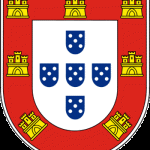|
Start the music: Saudades de Coimbra by Edmundo Bettencourt. Performed by Verdes Anos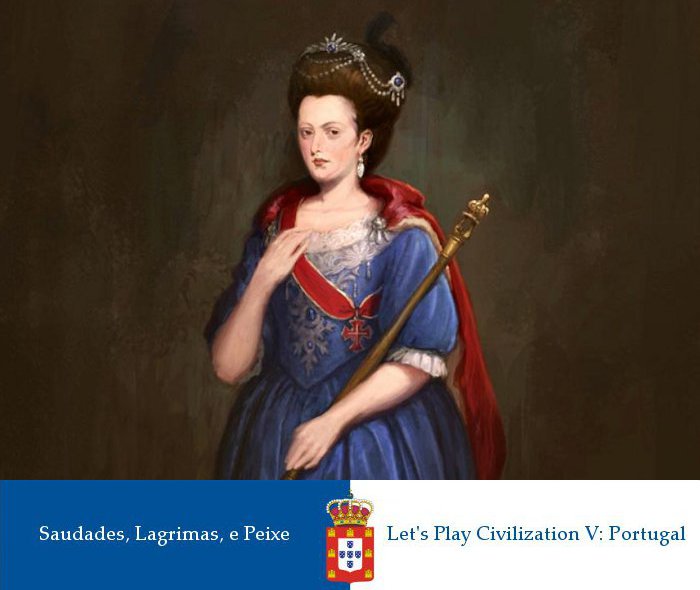 Bom dia, everyone, and welcome to my Let's Play of Civilization V: Brave New World! What is this lunacy? Civilization V is a board game-esque PC title made by Firaxis which allows players to play as various imperial states of historical importance, and achieve world domination through various means, be they military, diplomatic, cultural, or scientific. What is special about this game is that it randomizes the world and allows for complete ahistorical madness, resulting in scenarios like Joseon Koreans versus Aztecs fighting for control over a shared continent, or Byzantines and Babylonians rising to global prominence in the nuclear age. Compare and contrast Paradox Development Studios' Grand Strategy series, which are more in the vein of "historical simulation". Civilization V is more of a "historical game", and as such it occupies a very different scope. What are the specifics of your game? My own game will be featuring Portugal, as represented by Queen Maria I, an...interesting choice of representative figure. The game claims she was responsible for continuity of Portuguese monarchical rule during the Napoleonic wars and the transition to independence of Portugal's biggest colonial holding in Brazil, but also glosses over the fact that she was infamously manic and was consequently declared insane and unfit to govern during that same period. With this LP, I'm hoping to introduce everyone to the game and its myriad complicated mechanics in an approachable fashion, and invite readers to determine the fate of the nation of Portugal at every possible opportunity using bold text. I will also take the opportunity, when appropriate, to introduce people to a few fascinating aspects of Portuguese history and culture, since it is the land of a large part of my family and a place that holds some interest to me. I hope you all enjoy the trip as we embark on this epic saga of longing, tears, and fish. Table of Contents                           
ModeWondershot fucked around with this message at 04:09 on Nov 10, 2016 |
|
|
|

|
| # ? Apr 23, 2024 09:18 |
|
Nota Bem: The Use of Portuguese In This Thread For the benefit of those reading through the thread and occasionally curious about the use of Portuguese, I'll be using this second post from now on to detail a few notes about Portuguese phrases and language. Accents: Ã/ã : A with tilde. Defined by Wikipedia as "nasal near open vowel", it can be best expressed as an "a" sound with a nasal inflection so strong that it is almost an "n" sound instead. Think of it expressed as sounding like "Ahn". In Spanish, similar words are usually just replaced with an "an" such as "São" (Portuguese) vs. "San" (Spanish) or "João" (Portuguese" vs. "Juan" (Spanish). ç : C with cedilla. This is much simpler, as it is used as a hard "s". The only trick is that it is not capitalized, because it almost never shows up at the beginning of a word. If it did, it would just be replaced with a capital "S". É/é : E acute. Also used similarly in other Romance languages like French and Spanish. It is closest to "eh" (soft "h", not like "a") in pronunciation where the "e" sound is emphasized greatly. Õ/õ : O with tilde. Defined by Wikipedia as "nasal close-mid back rounded vowel", it is used to emphasize an "oh" sound, commonly before an "e" in which case it tends to come out like "ooy". Chapter Titles: Palavra de Uma Nota Só When I first started writing this LP, I wanted to be able to incorporate the Portuguese language in a way that wasn't distracting to someone who doesn't know it, while hopefully still being able to draw attention to its usage. Chapter titles seemed the best way of doing so, and while I was a little worried that it wouldn't go over well, I'm glad people seemed to enjoy the LP thus far with them. Thus, I would like to offer my translation of what the chapter titles are, for those interested. They are covered by spoiler tags for those who still want to guess at what they are or preserve the mystery. Prologue: Begin Chapter 1: Faith of the Queen Chapter 2: Hunting in Solitude Chapter 3: For the Love of God Chapter 4: Water Chapter 5: Sebastian Chapter 6: Revolution in Peace Chapter 7: Portuguese Marvels Chapter 8: Changes Chapter 9: Luck Chapter 10: Stars Chapter 11: of Gama (the surname) Chapter 12: Dreams and Nightmares Chapter 13: Before the Storm Chapter 14: Without Friends Chapter 15: Blood Money Chapter 16: Limitations of Peace Chapter 17: Portuguese Republic Chapter 18: Liberty or Death Chapter 19: Portuguese Voice Chapter 20: Vengeance, Justice Chapter 21: The Lamentations Chapter 22: Counterweight Chapter 23: Birth Chapter 24: Law and Order Chapter 25: Last World War Chapter 26: Portuguese Peace ModeWondershot fucked around with this message at 02:23 on Nov 23, 2016 |
|
|
|
Prologue Vamos começar!  Anytime you go to start a game of Civilization (hereinafter Civ) V, it's worth looking at the game setup screen here. It is used to determine your Civ choice, map, number of players, difficulty, and pace. In this case, Continents establishes that there will most likely be 2-4 Civs per landmass, and the size ensures that we will have an interesting number of neighbours. The Difficulty basically determines whether you or the AI opponents have any advantages from the game start. Prince difficulty just means that the player and the AI opponents all have almost exactly the same number of units and resources at game start, meaning that advantage is skewed slightly towards the player as the AI generally does not play as well as a human with some idea of what they are doing. However, as I will be taking orders from the thread for certain actions and behaviours, I think this should put everyone in this game on equal footing.  This splash page of sorts narrates a bit of the story of the ruler we are playing as, and gives us a bit of background on the country. Again, Dona Maria Primeira might be taking a bit too much credit here given her mental state at the time, but it is still accurate to say that she was around to see the events described, and the continuity of Portuguese government at the time was predicated on her rule. This page also descibes our unique ability (UA) which is Mare Clausum. Named after a little known act of political legerdemain as part of a treaty established with Spain, Mare Clausum says that we gain double the amount of gold from resources that our Civ has for purposes of calculating trade route value. For now, all that means is that Portugal makes gains in trade that other Civs don't at all stages of the game, so it is worth focusing on trade whenever possible. The unique unit (UU) we have is the Nau which the Portuguese word for carrack, a sailing ship commonly used in the Age of Exploration. Of note were the fact that early carrack designs were quite modular, and one could be equipped for either combat or trade rather easily. To that end, nau in this game are used as combat ships, but also have an ability that can be used to generate extra money. The third ability we have is a unique tile improvement which is a little unusual. The Feitoria (factory) is a type of European colonial fortified trading post that was often built to be used as a market in overseas territories. I'll describe a little more of what they do in the game when the time comes to build them, but let's get a little more into the early game first. Music: Saudades de Coimbra (Peace)  This here is our game map, where we see a lot to deal with from minute one. The unit highlighted by the god-rays in the centre of the screen is our Settler.  The Settler is used to found our first city, the capital and basis of our entire Civ. It's important that a city is settled in a place with good resources available, and the start we have is pretty good, as we have hills for added production value, a river nearby for access to unique benefits, and two units of wheat in adjacent hexes for food (elephants two hexes away are pretty cool too). Therefore we will settle here, despite a glaring lack of fish.  Just like that, we have our capital. The city screen here tells us quite a bit about the city currently selected. The city's statistics in the upper left provide information on what each city produces, which is in turn based on the tiles within its borders and population. Food causes population to increase, and more Food leads to faster growth. More citizens mean more resources will be accessed by that city, so Food can sort of be thought of as the EXP which levels up your city, while also being the lifeblood that keeps it going, and is therefore two kinds of essential. Production determines how fast your city builds things, Gold how much money it makes (or costs) each turn, and the stats for Science, Faith, Tourism and Culture determine how much it produces of those values, though these statistics will be explained a little later. For now, something needs to be changed:  Muito bem.  Now the unit we have highlighted is our Warrior, whom we will use to explore the area. Warriors have a movement speed of 2, which means they can cross 2 tiles of flat terrain in a turn, and a sight range of 2, which means they see 2 tiles away from themselves unless their line of sight is blocked by mountains, hills, or forests. We'll move the Warrior onto that wheat field to our southeast, near the fog.  Thus we reveal part of the map, though we do recall what is on each tile, fog of war will darken any tile we do not observe directly, thus we will not be able to tell whether or not other units may be hiding there after we leave.  Now that our units are covered, let us return to Lisboa and figure out what to do with it. Cities should spend every turn producing something, whether unit or building or, eventually, bonus stats like science points or money. For now, we have the option of building a Worker, who improves tile gains and exploits resources in our territory, a Scout, who moves more efficiently than a Warrior but is weaker, another Warrior, or a Monument, which will cause our city to start producing more Culture. In the interest of having our city make more all-important Food early, I'll start with a Worker.  As the description shows, a Worker will create an Improvement on a tile that is near the city, and Improvements cause the city to gain additional stats. For instance, the first and most basic Improvement is a Farm that will give a minimum of one extra Food to the tile it is based on, so a city with a healthy number of Farms will grow more quickly than one that does not.  Last for this turn is our science. Civs make advances along identical tech trees, but must choose what to prioritize in order to make gains in certain areas early. For me, a strong start is to branch into Pottery, as it leads to the earliest science-producing tech of Writing, which will push us further along the tree faster, and Sailing, which is essential to being Portuguese.  The early tech tree is above for your reference, though more details about how it works will, as with most things, have to wait for later. With this, we end our turn.  Starting the next turn, I move the Warrior further east to scout the area, and spot something interesting (apart from more elephants) in the southwest-most tile. Ruins!  Ruins are early-game bonuses seeded at random in each world, and the first Civ to touch one with a unit gets a random bonus. The bonus can be middling, or it can be amazing, like this one. Remember that population growth is tantamount to a city leveling up, so a free level is nothing to sneeze at.  Back at our city screen, the added citizen is already boosting our production, which has shaved off a turn spent on Worker creation. What has happened is that the new citizen has started "working" the other Wheat tile next to Lisboa, meaning that it is adding the statistics provided by that tile to Lisboa's total. Therefore, a larger population will sustain itself and improve the city by working new adjacent tiles for Food and other resources, but it will also need more Food in turn to maintain a larger population. Science has also increased thanks to the additional citizen, which will have a greater impact in the longer term by reducing the overall number of turns required to research new tech.  Two turns later, I move my Warrior northeast and find Mt. Kilimanjaro. Between this and the omnipresence of elephants and wheat, our Portugal is evidently located in this world's equivalent of Africa (note to self: next city will have to be called Angola). These Natural Wonders are nice to find early, as they give unique benefits to Civs who have them within their borders, and just finding them makes your citizenry happy, adding a point to your global Happiness score. Happiness is important because it allows empires to grow larger, but we will get to that a little later. For now, I'll be making plans to put a future city next to the mountain to reap its benefits of 3 food and 2 culture per turn, and moving my Warrior next to it gives them the permanent bonus of "Altitude Training", which allows them to spend half as many movement points as normal crossing hills, and gives them a bonus to their combat potential in an environment that has hills. Legal!  Oh, and there's a ruin next to it too!  Bonus isn't that great, though.  Barbarian encampments are a sort of wild-card enemy spawner that are seeded randomly in the world like ruins, and they generate pseudo-warriors called Brutes in the early game that attack Civs close to them. They aren't too dangerous if you know how to deal with them, but they can become quite numerous and Barbarians can make advances along the tech tree to create more powerful units eventually.  A little more exploration and we start to get a sense of the shape of our continent. I don't want to move the Warrior too far from home right away in case it becomes a target for barbarians, but I have to balance that risk against the reward of knowing what is in the area and potentially finding more ruins for more bonuses. It's like many aspects of this game in that while you will eventually be able to get everything you will need, you will have to make decisions and sacrifice certain advantages in favour of others. (Oh, and we found 2 more herds of elephants and a herd of bison, this is going to make trade kind of interesting, let me tell you.)  To better scout my immediate environs, I start moving back west in order to see what is to Lisboa's north.  Barbarians, and more bison and elephants.  On passing the turn, we finish researching Pottery, and can now begin building projects to make even more use of our wheat, or start the inexorable process of becoming Catholic.  Another two steps west for the Warrior reveals another ruin, so that will become our more immediate priority next turn over the barbarians. There is something else at the northwest edge of the Warrior's sight range, but we will get to that a little later.  I also determine that our next bit of research ought to be Writing, so that we can start filling out more of the tree a bit quicker.  These ruins were worth an excellent bonus, as early Culture is a great boost for reasons I will establish in just a moment, however something even more amazing has happened:  WE FINALLY FOUND FISH! Graças a Deus! We won't be able to act on it for a while, but it's worth mentioning.  Another turn passes, and our Worker is ready to start doing as his name suggests! However, something else pressing is made apparent to us thanks to that Culture gain from last turn:  We have the option of picking our first Social Policy. Social Policies are tree-based bonuses that we acquire every time we break a certain Culture threshold, which is in turn determined by how many Policies we already have and how many cities are in our Civ. The more Policies and cities, the more Culture is required until the next one. Policies affect individual Civs on an empire-wide scale. Unlike with technologies, however, it is impossible to acquire every Policy, and our time is generally best spent picking one Policy policy tree and getting every possible bonus from that tree before moving on (Policy trees also provide additional bonuses upon being filled completely). The graphic shows 9 trees (and Ideology) but for now only 4 trees are available as the rest are unlocked through tech. Picking a Policy tree has an immediate effect on how the Civ best develops and eventually achieves victory, therefore it is one of the most relevant early-game choices that a player will make. ...Which is why it's time for the thread to decide what values the tribe of Portugal will embrace and determine our first Social Policy tree. I'll provide a simple explanation of each tree to inform your decision: Tradition provides +3 culture per turn to our Capital and will allow us to someday build the Hanging Gardens. The bonuses in the tree contribute to the construction of Wonders (unique buildings like the Hanging Gardens) and give large bonuses to a limited number of cities. It's considered the bonus to take if your Civ will have fewer, more capable cities, and its benefits are best realized in the early game. Liberty provides +1 culture to every city in our Civ, and allows us to someday build the Pyramids. The bonuses in this tree apply to all cities and give early bonuses to city growth and development across a wider empire, which is good for Civs that will spread far and wide and have a larger overall number of cities, and its' benefits are less immediate but effective for a much longer stretch of the game. I tend to like picking this as a more exploration-happy Portugal, but whether this persists is your decision. Honor makes military units 33% more effective against Barbarians, gives us culture whenever we kill Barbarians, and allows us to someday build the Statue of Zeus. Honor, despite the name, is best suited for a Civ that expands through war and seizure of cities belonging to other Civs, but must make sacrifices to early-game growth and general city effectiveness to achieve that. I don't generally pick it for a Civ that doesn't otherwise have some sort of war-focused UA or UU, but this is your call to make. Piety focuses on religion, making us build the Faith-generating buildings Shrine and Temple 50% more quickly while also allowing us to someday build the Great Mosque of Djenne. Piety won't help a Civ expand, but it will help that Civ's religion tremendously, and that can have its own impact on the game, since a religion provides separate bonuses to a Civ that has it and the Civ that created it. The particulars of religion's effects on the game will have to be expounded upon later, but for now this is the one to pick if Portugal is to be as Catholic in this game as Maria I was in her day. Voting will end in 2 days from now, so exercise your will over the populace by specifying which tree to follow! Boa sorte! ModeWondershot fucked around with this message at 01:59 on Nov 23, 2016 |
|
|
|
Liberty, go wide.
|
|
|
|
Can I vote for just the Tradition opener, and then Liberty after that?
|
|
|
|
tradition opener is the mechanically correct choice and therefore the only real choice wondershot can get a zoomed out screenshot of the state of the empire at the end of every post as a neat way to show progress
|
|
|
|
Piety, because I wanna see you struggle.
|
|
|
|
biosterous posted:Can I vote for just the Tradition opener, and then Liberty after that? When the time comes for the second policy I may ask the thread to again fill Dona Maria's head with guidance, so I'll keep in mind your selection. skullhead tethyis posted:wondershot can get a zoomed out screenshot of the state of the empire at the end of every post as a neat way to show progress All right, thank you for the suggestion! I may go back and forth between using the standard map and switching to Strategic View to see what looks better. rotinaj posted:Piety, because I wanna see you struggle. I think the nun in your av just wants more attention.
|
|
|
|
Tradition.
|
|
|
|
Let's go with Tradition. That said, you might want to look into shrinking your screenshots a tad because they're personally stretching my browser. I think the Archive also has a limit on the dimensions of pictures.
|
|
|
|
Liberty What can I say. I like the extra worker/settler.
|
|
|
|
Liberty
|
|
|
|
Is Raging Barbarians on? I wanna say Honor opener at least. But Tradition is...well, traditional. Well, we certainly want to settle near Kilimanjaro and make that a troop place, just to secure it. Having something like that is valuable as hell. We can't tell quite how much access we have to the sea-are any of those water tiles we can see tagged as 'lake'? Bloodly fucked around with this message at 05:31 on Apr 1, 2016 |
|
|
|
I'm boring, Tradition.
|
|
|
|
Piety you dorkuses, he just said he's playing on easytown difficulty because he expects us to make silly choices
|
|
|
|
Piety because I like the concept of turning this civ into a collection of religious nutcases.
|
|
|
|
Junior G-man posted:Piety because I like the concept of turning this civ into a collection of religious nutcases. Sadly, this game doesn't have the option of projecting a giant image of your to sing/yell at enemy cities until they convert to your particular brand of religious wackjobness. (Spore, you are a silly game) But I say Tradition
|
|
|
|
SkyTalon2314 posted:Sadly, this game doesn't have the option of projecting a giant image of your to sing/yell at enemy cities until they convert to your particular brand of religious wackjobness. (Spore, you are a silly game) But in my imagination it certainly does 
|
|
|
|
hopeandjoy posted:That said, you might want to look into shrinking your screenshots a tad because they're personally stretching my browser. I think the Archive also has a limit on the dimensions of pictures. Thank you very much for letting me know. I remember reading something to the effect of "keep it under 800px wide so as to avoid breaking the forums," but am not finding a specific reference to the size limit on the Archives. I'll try to ask about it tomorrow, unless someone here knows exactly how large I should make the next batch of images?... Bloodly posted:Is Raging Barbarians on? Raging Barbarians is not on as I wanted to keep this game to default options. No water tile we see so far is indicated as "lake," and we may or may not have inland seas either way. Gyra_Solune posted:Piety you dorkuses, he just said he's playing on easytown difficulty because he expects us to make silly choices Well, when playing as a famously insane monarch it certainly forms a sound justification for any type of counter-intuitive choice. By all means, go for whatever silliness seems right. Junior G-man posted:Piety because I like the concept of turning this civ into a collection of religious nutcases. It's also a stereotype of what the Portuguese are actually like, so it works!
|
|
|
|
The biggest danger in going Piety is if there's any civs that ARE geared more for religion about; Piety doesn't make up for that. But we haven't seen any early pop-ups on the subject yet, and there would have been one by now, I think.
|
|
|
|
ModeWondershot posted:Thank you very much for letting me know. I remember reading something to the effect of "keep it under 800px wide so as to avoid breaking the forums," but am not finding a specific reference to the size limit on the Archives. I'll try to ask about it tomorrow, unless someone here knows exactly how large I should make the next batch of images?... baldurk posted:The archive layout limits images to 900px wide. Any larger than that and they'll need to be thumbnail-linked or resized down, so ideally bear this in mind when making your LP. If all of your screenshots are 1024px wide or something I can do a quick batch process to resize them down, but let me know in advance if you want me to do that.
|
|
|
|
Liberty or death. Preferably liberty, though.
|
|
|
|
Piety is an absolutely terrible first choice, easily the worst you can pick. Deus Vult!
|
|
|
|
Piety. Convert every other civ to our religion and become the pope.
|
|
|
|
Junior G-man posted:Piety because I like the concept of turning this civ into a collection of religious nutcases.
|
|
|
|
Junior G-man posted:Piety because I like the concept of turning this civ into a collection of religious nutcases. Might as well do this. Incidentally, I say we should worship the goddess of the hunt (I believe that's how the one I have in mind is called)
|
|
|
|
THREAD VOTES FOR POLICY Tradition 7 Piety 7 (I am assuming AlphaKretin voted Piety with his post) Liberty 4 Looks like a close one, and in the event of a tie, I'll do my utmost to reflect the wishes of the thread with my next few choices. My plan is to play for another 10-15 turns after this, so if the next Policy choice appears in the next 5 turns or so in the event that Tradition wins I'll make the call as to the next one, then invite the thread to make choices regarding other aspects of the game. Voting will close in 6 hours from now, to give a chance for a tiebreaker.
|
|
|
|
Tradition
|
|
|
|
Oh yeah, I was voting that, sorry. I'll be clearer in the future. 
|
|
|
|
piety
|
|
|
|
I'll switch my vote to Piety. Seems more fun than just hitting the optimal strategy.
|
|
|
|
Torrannor posted:I'm boring, Tradition. Switching my vote from Tradition to Piety. Deus vult!
|
|
|
|
It's been a year or two since my last Civ 5 game but if I recall there's a clearly best strategy that goes something like tradition ---> liberty and most of the rest are not as good. I have been unable to try other routes because I don't have the willpower. So piety I guess is what I'm saying.
|
|
|
|
Tradition
|
|
|
|
I'm only a fan of Poland, Austria, Russia, and Ethiopia in this game civ-wise. Tradition is also a fantastic policy tree but mostly only in the early game. I play with Poland so i usually have no problem with policies.
|
|
|
|
Piety is the only righteous option.
|
|
|
|
Nigerian_Prince posted:I'm only a fan of Poland, Austria, Russia, and Ethiopia in this game civ-wise. I think I'll try a Poland run whenever I fire up Civ 5 next. The extra policy points seem like a much more interesting/fun bonus than the "extra production/money/food here and there" Civ bonuses that I usually play with. Has anyone here tried Civ revolutions 2 on a tablet? Is it any good? I'd love a tablet Civ game but not if it's garbage. What they should really do is port Alpha Centauri to tablets but they aren't gonna do that are they.
|
|
|
|
FINAL TALLY Piety 12 Tradition 8 Liberty 4 Dona Maria has heard the voice of Adeus!
|
|
|
|
 In the Ancient Era, Queen Maria heard the voice of God and His demand for glory and recognition, and that her people must demonstrate reverence towards Him, as He alone was responsible for bringing them into this world. 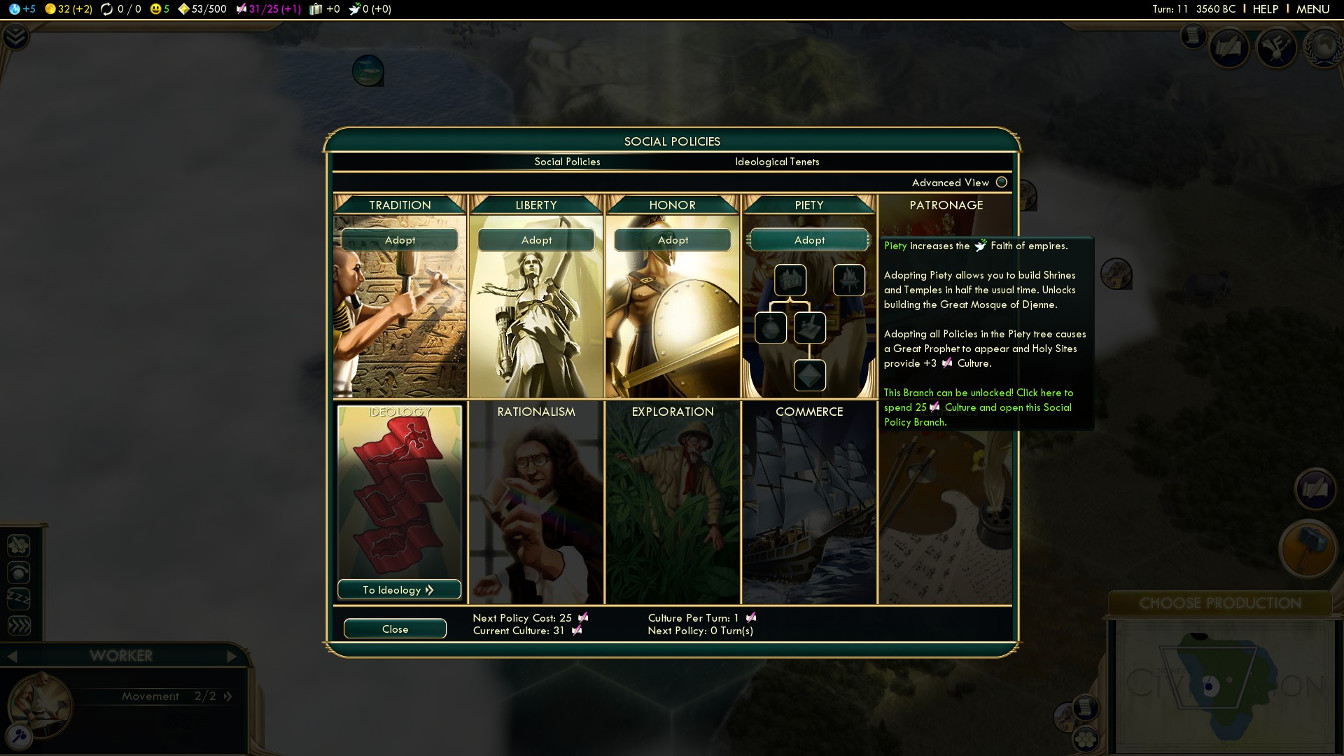 Thus, the people of Portugal were taught to recognize that they live, or die, succeed, or fail, entirely at His whim, and must work diligently to demonstrate their love for their God, lest He someday abandon them in the wilderness. Thus, Dona Maria Primeira was thereafter known as Maria the Pious, who brought her people into the embrace of God, that they might grow and prosper under His watchful eyes. 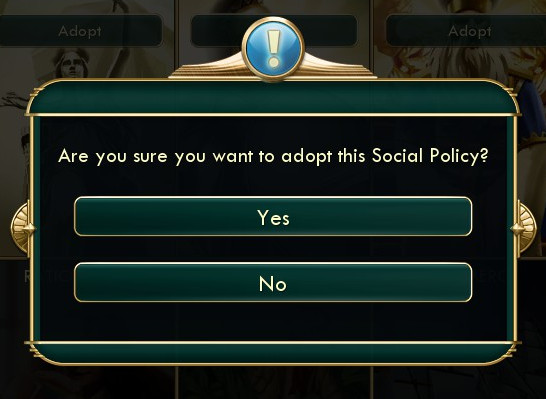 As Social Policies, unlike scientific advances or construction projects, are provided immediately upon selection, they cannot be taken back, so the game wants to make sure we are prepared to walk with God. For everyone's reference, from this point forward the Policy bonuses are as follows, going from left to right, top to bottom.      Our fate thus decided, we return to the more secular matter of food production. 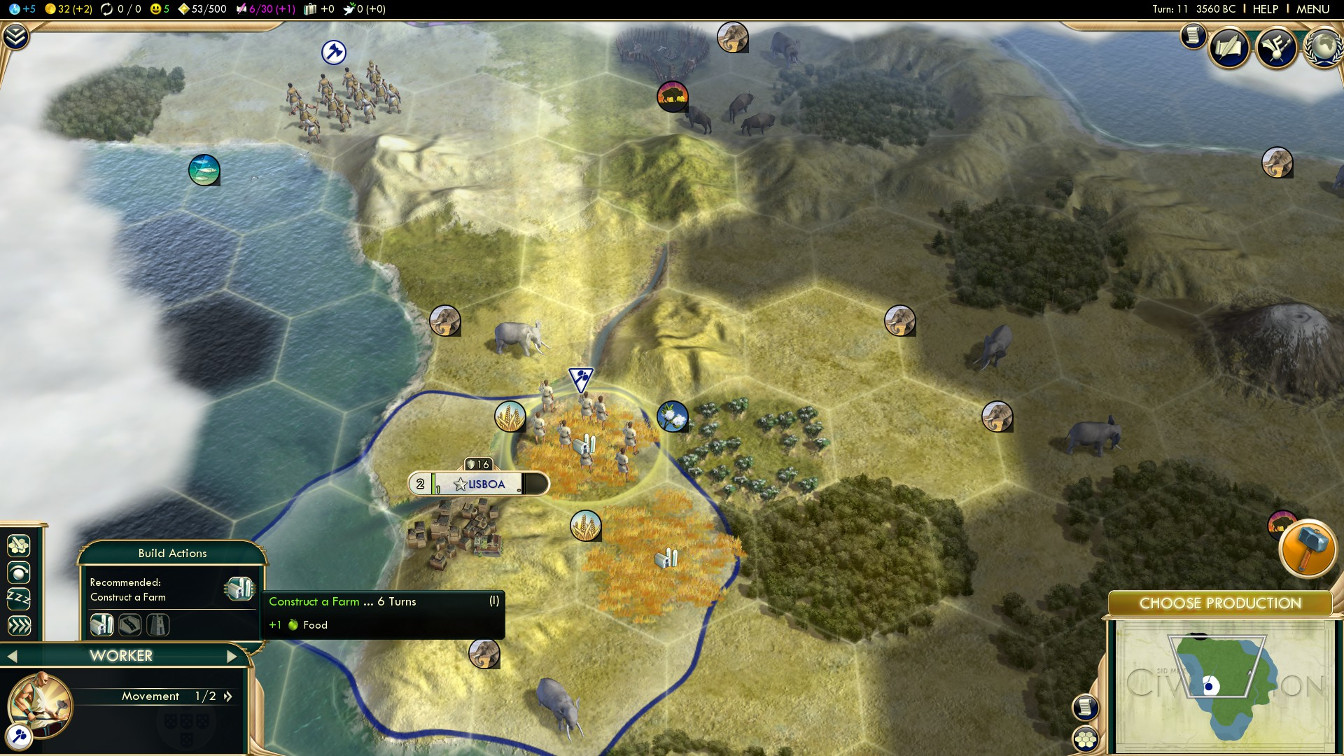 We move the Worker one tile and spend his remaining point of movement beginning the Tile Improvement process. As mentioned earlier, the Farm will provide one extra Food for the Wheat tile, but that will improve further with time and tech. As such, the two wheat provided to us makes for a strong starting point.  Meanwhile, up north, our Warrior goes to investigate the strange line further to the north, and finds something new:  City-States are independent mini-civilizations based on large cities based in countries not already included in the game as Civs (  ). The City-State has a Trait, a Personality, and a list of available Resources for trade. ). The City-State has a Trait, a Personality, and a list of available Resources for trade.City-States essentially work as fluid bonuses that can be provided to players that try to build up a relationship with them, indicated as an Influence score. Influence is earned through the completion of quests given from time to time by the City-State or the performance of certain actions, like eliminating nearby Barbarian units or giving the City-State gold or military units. At 30 influence, a City-State becomes a Friend and will grant a partial bonus based on its Trait, and access to its borders at no penalty. At 60 Influence it will become an Ally of the Civ with the highest Influence and grant a larger bonus, access to its Resources, and participate in wars on the side of its Ally. However, Influence decays over time so steps must be taken to maintain Ally status. Alternatively, you can go the antagonistic route and demand tribute from the City State in the form of Gold or Worker Units by intiumidating them with a larger army, though this method provides shorter-term bonuses that are on the whole a little weaker than the Influence bonuses. For the time being, we will let Vancouver do as they will since we do not have the means to increase Influence or demand tribute as of yet, but this will change with time. 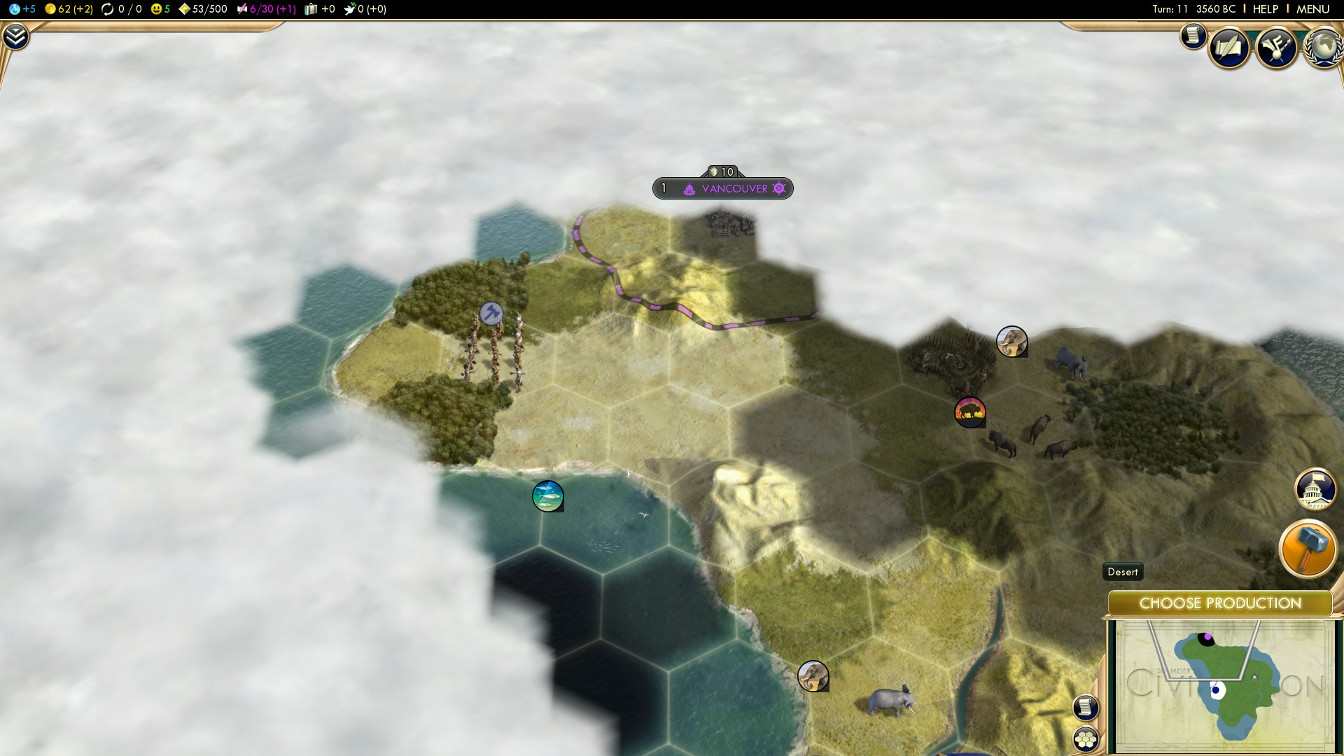 We explore further west and hit more coastline, so at the very least we know we are likely on the westernmost part of the continent. 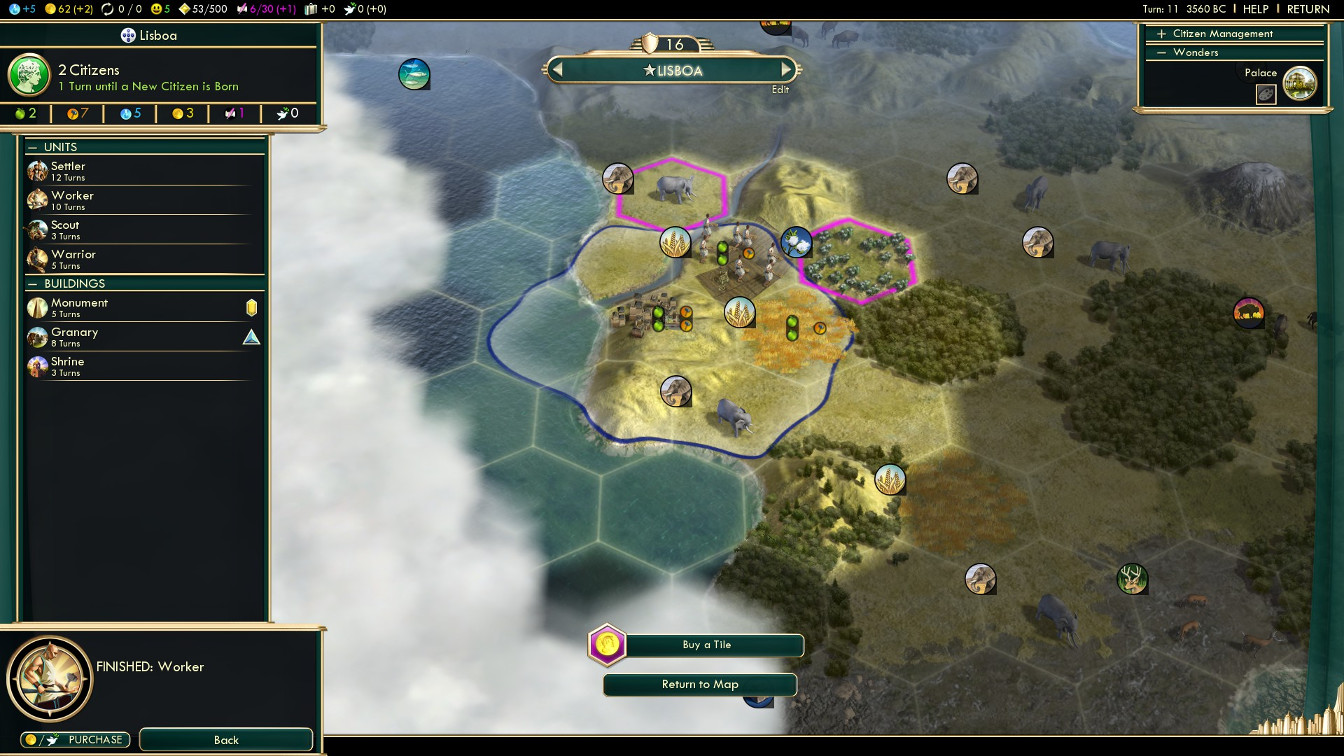 Back in Lisboa, our finished Worker has freed up the production queue, so we will use our newfound focus on Faith to construct a Shrine in a short time frame. 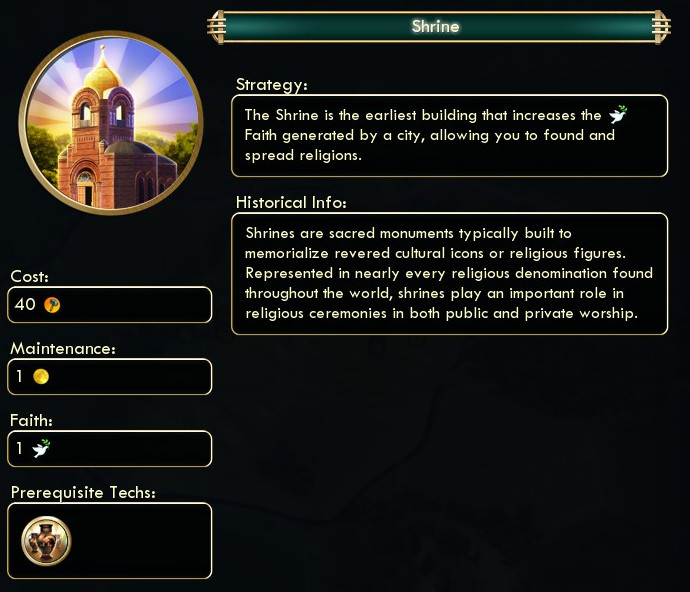 Buildings inside Cities provide bonus resources or traits to those cities, while typically having a maintenance cost associated with them as well. In this case, we will be paying 1 Gold per turn in exchange for 1 Faith per turn, and Faith will be necessary for us to develop a Pantheon, and eventually a Religion. 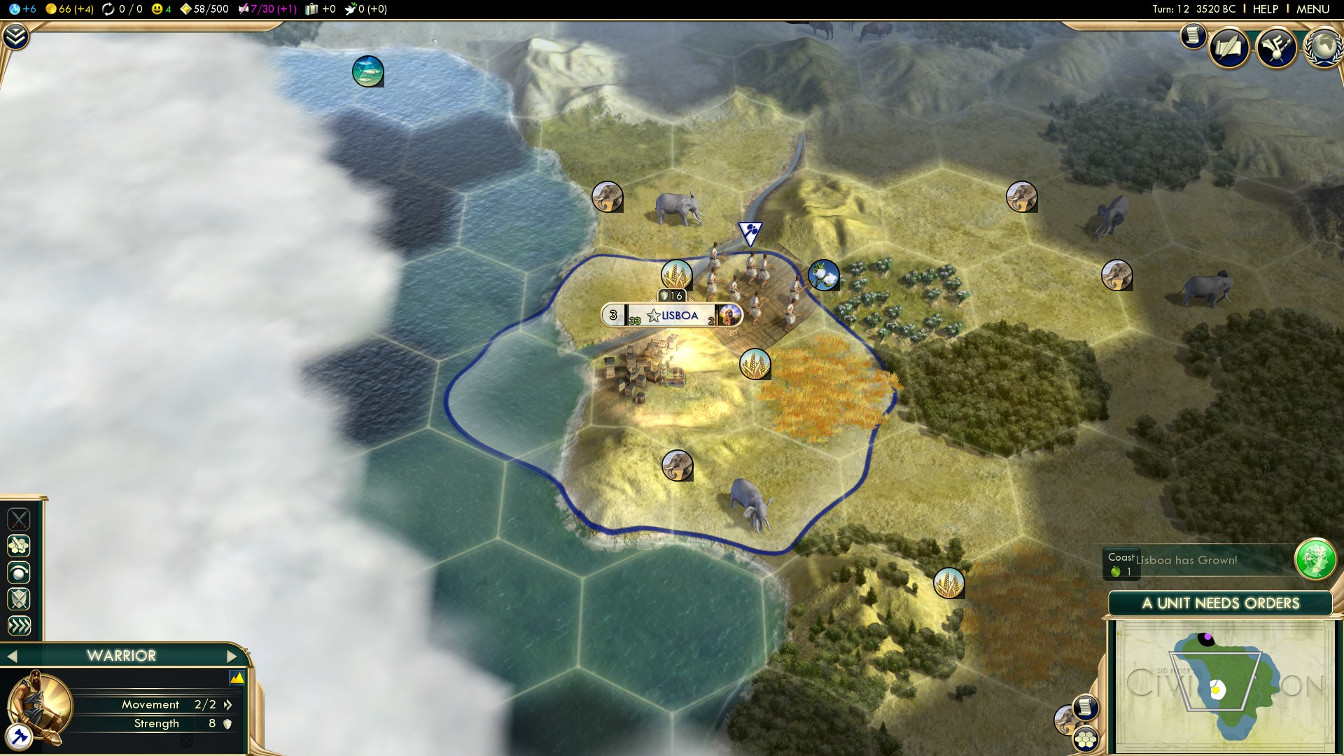 The turn passes, and Lisboa gains another Citizen thanks to our food stores.  At this time I will show off the Citizen Management overlay that we may find use for. Citizens in your city will always work tiles within your city borders (the green dots above each hex demonstrate which ones are being worked) and the game normally determines which tiles to work automatically, typically prioritizing food or tiles that provide unique bonuses such as Natural Wonders. However, we can also choose which tiles are worked using Citizen Management, which will be useful if we wish our cities to prioritize the production of certain types of resources. 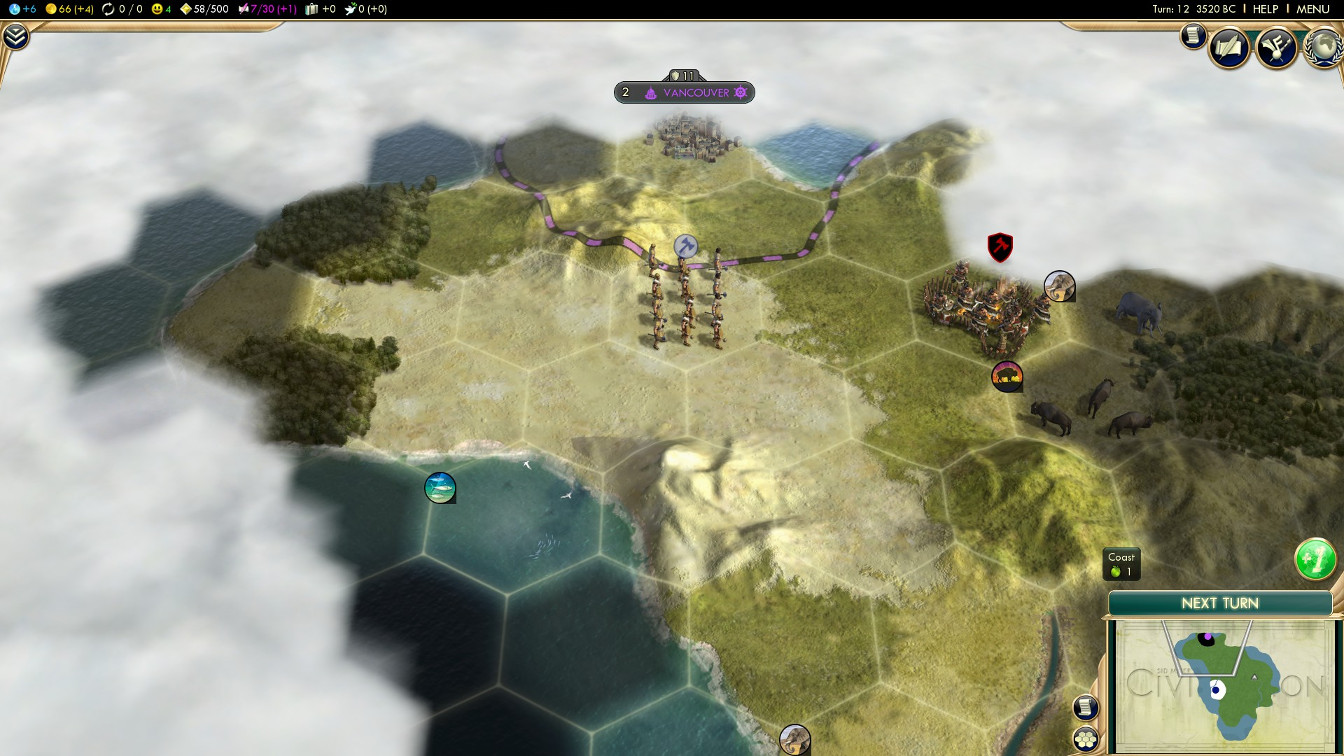 Our Warrior returns east to check on the Barbarian units... 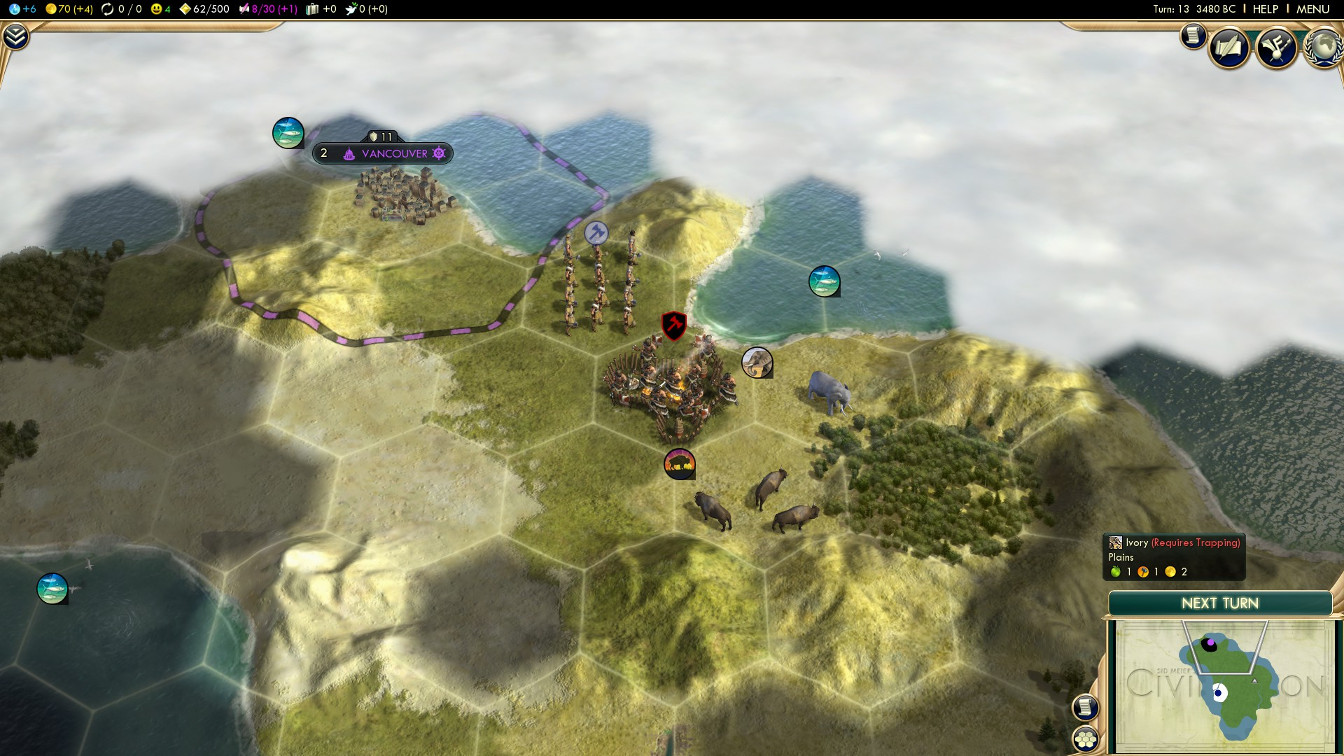 ...and spends the next turn going north slightly to cut them off from direct access to Vancouver. 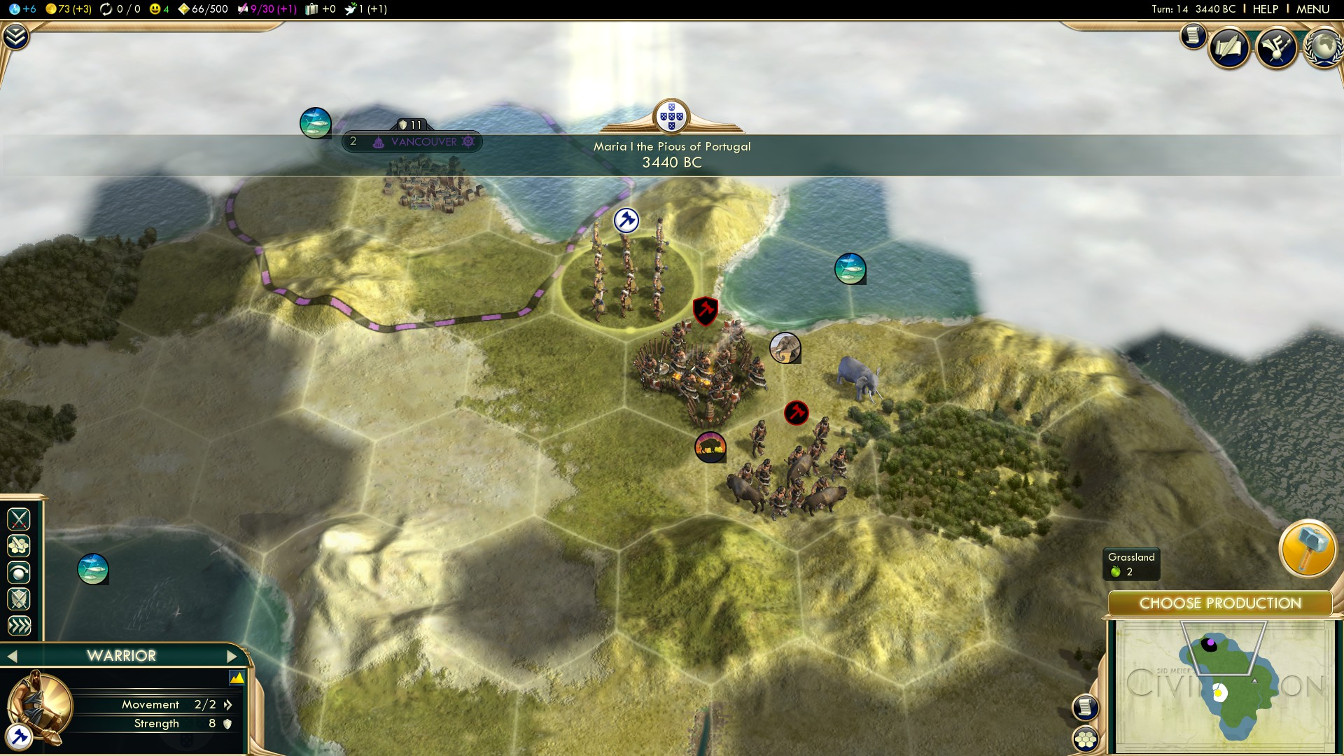 On the next turn, the Encampment spawns a second Brute unit which is free to move and wreak havoc, since it is not parked on the Encampment. 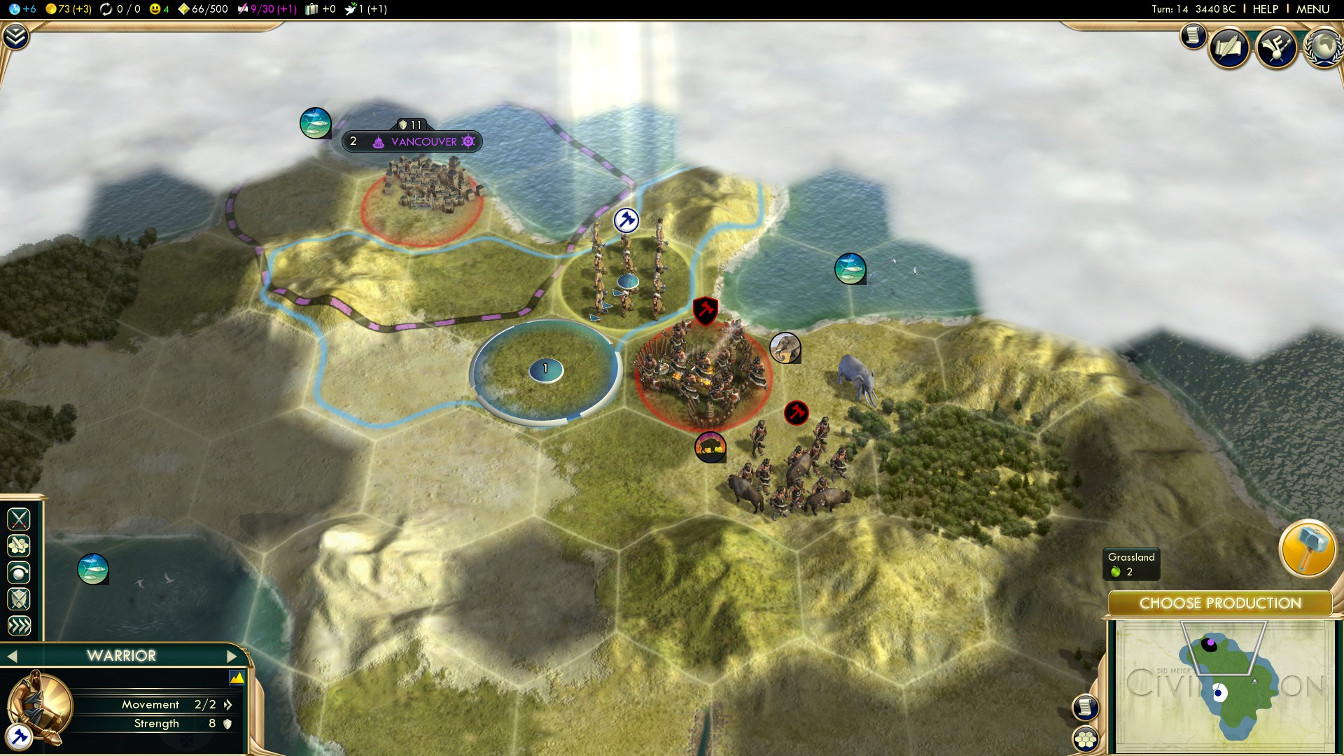 At this point I also demonstrate the Zone of Control that military units have. It is not possible to move more than one tile when moving from one tile to another within an enemy unit's Zone of Control, which are the unit's six adjacent hexes. As such, while the blue border demonstrates that we can move two tiles back, we cannot move two tiles around the enemy unit. 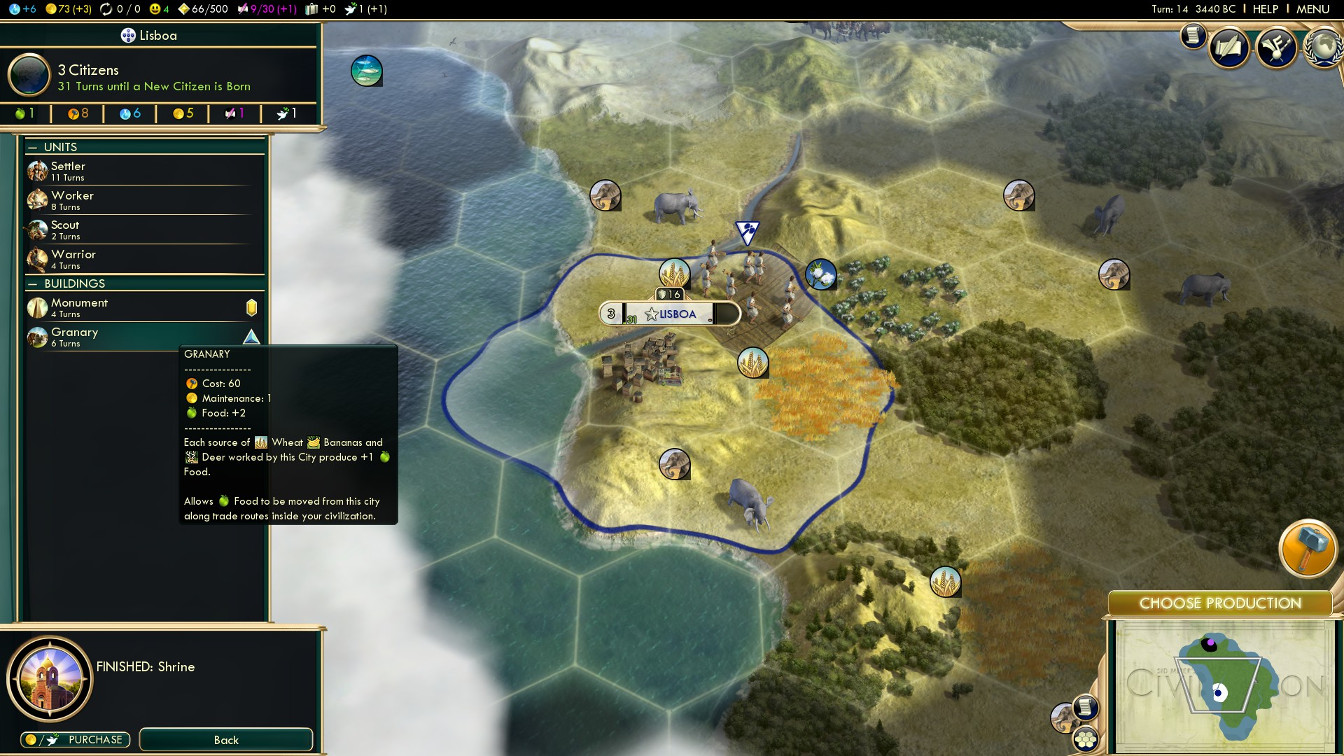 Back in Lisboa, our Shrine is done quickly, so we begin construction of a Granary in order to gain some support for our food.  The most compelling reason to do so is the additional +1 food granted to tiles with wheat, meaning that between the Farm and the Granary, our Wheat tiles will have double their normal food yield.  Outside Vancouver, the Barbarians have moved towards the City State, pillage and destruction on their minds. At this time, I will highlight the Warrior to talk a bit more about how Military Units function. 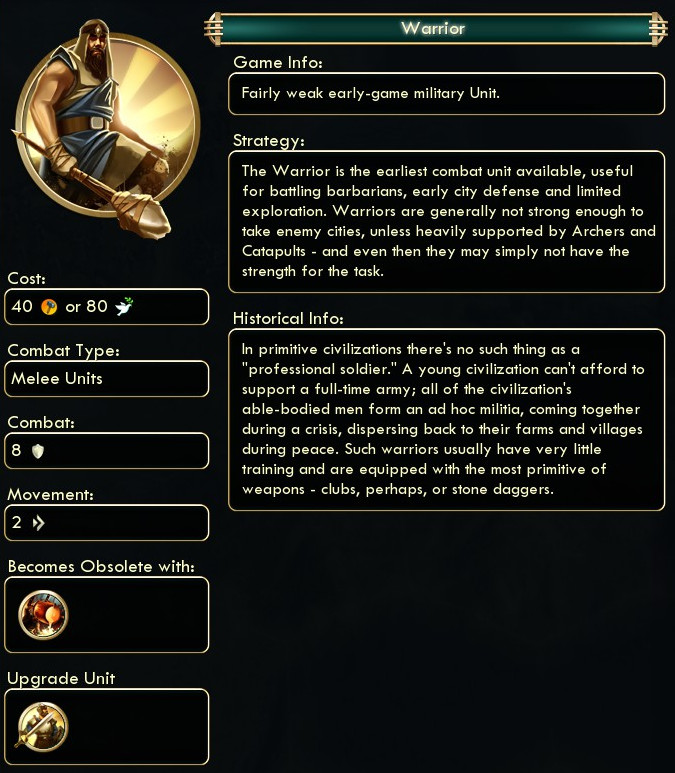 Military units' effectiveness is demonstrated by their Strength in melee. When two units engage each other, the difference between their Strengths, and a minor amount of RNG, will determine how much damage each unit takes from their 100 HP. 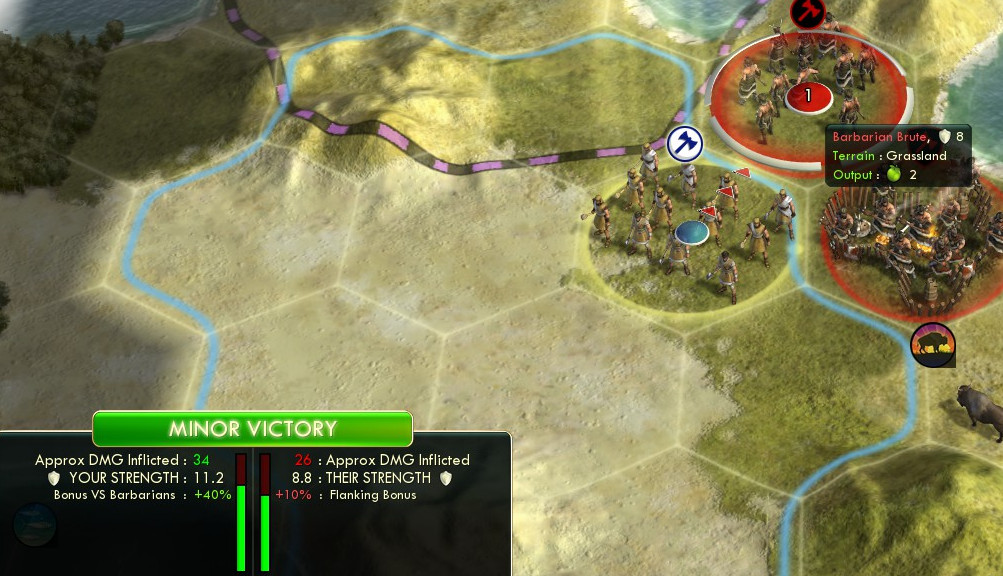 The zoomed-in view here shows the game's calculation of a combat result in the bottom left, as well as the modifiers applied to each unit's Strength based on circumstance. In general, units gain positive Strength modifiers for: Fighting Barbarians, fighting in terrain where they have a trained advantage, certain bonuses from Social Policies or Buildings, having adjacent allies threatening the enemy units (the "flanking" bonus) and taking a fortified stance across a river or in hilly or wooded terrain. Units lose Strenth if their Civs have low Happiness or they are trying to take defensive positions on top of Resources. 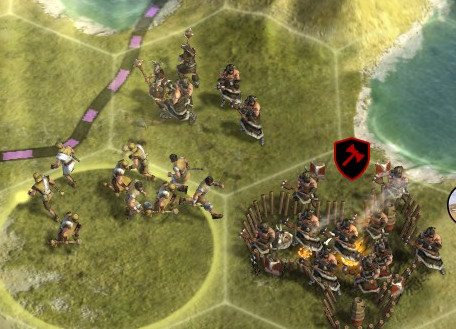 We decide to fight with the units we have, and a melee ensues. 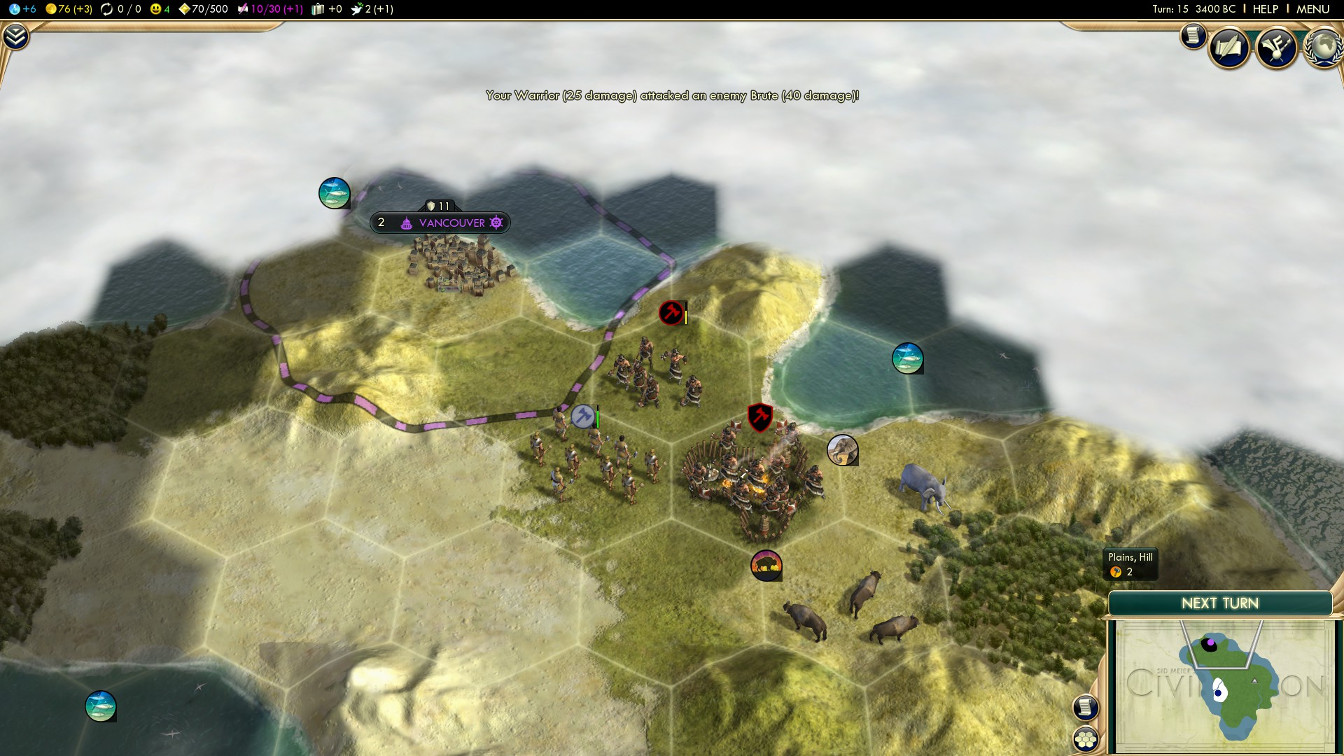 When the dust clears, they have taken more damage than us, so we have the advantage.  Back in Lisboa, our borders have grown to occupy the northernmost space, containing one of the Elephants. Borders grow as a function of the Cultural output of the city, and as our Cultural output is somewhat low, our borders will grow more slowly.  In Vancouver, the City-State decides to open fire on the nearby Barbarian, which it can do as Cities have a ranged attack they can use on enemy units within two tiles. The strength of the attack is based on the technology level of the Civ to which the City belongs, as well as factors like certain buildings and overall number of citizens. 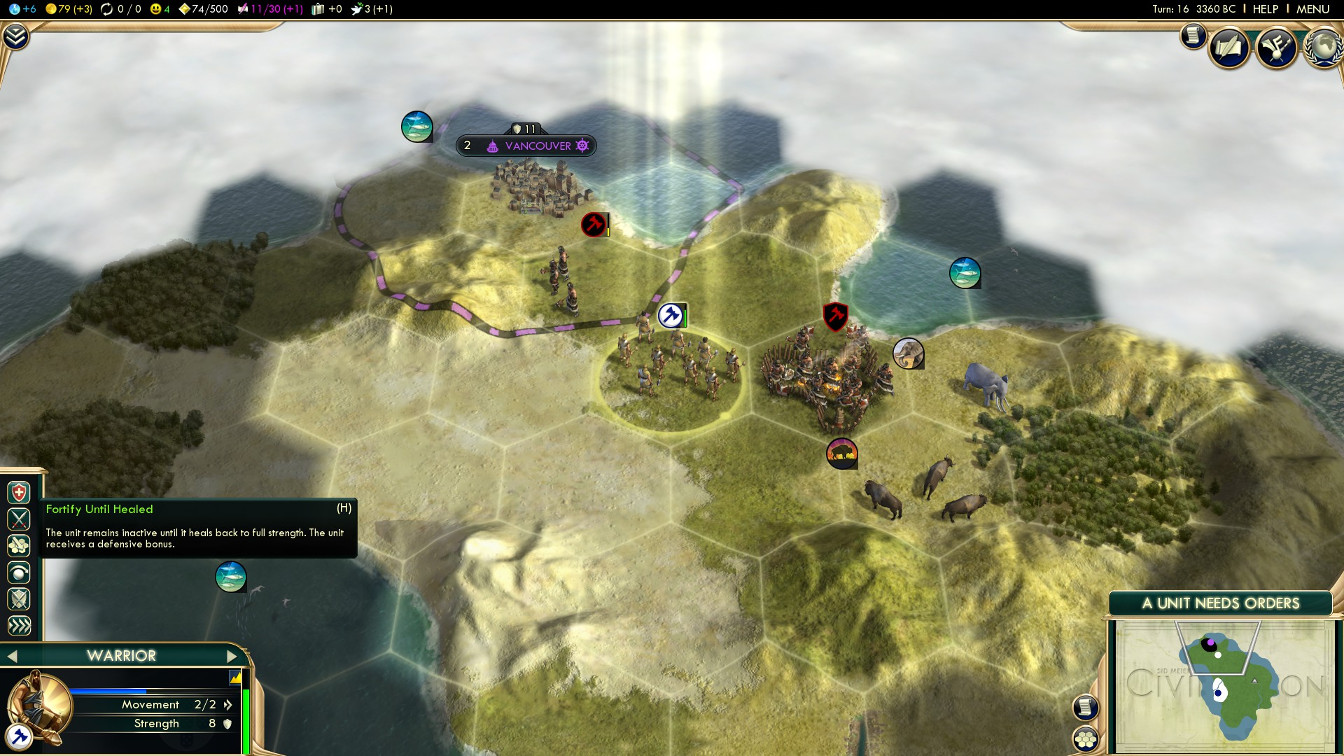 The Barbarian moves in, but our Warrior will instead fortify for a turn and spend time to gain a defensive bonus and heal some of the damage from the previous engagement. That Barbarian is unlikely to do any damage to Vancouver in its state. 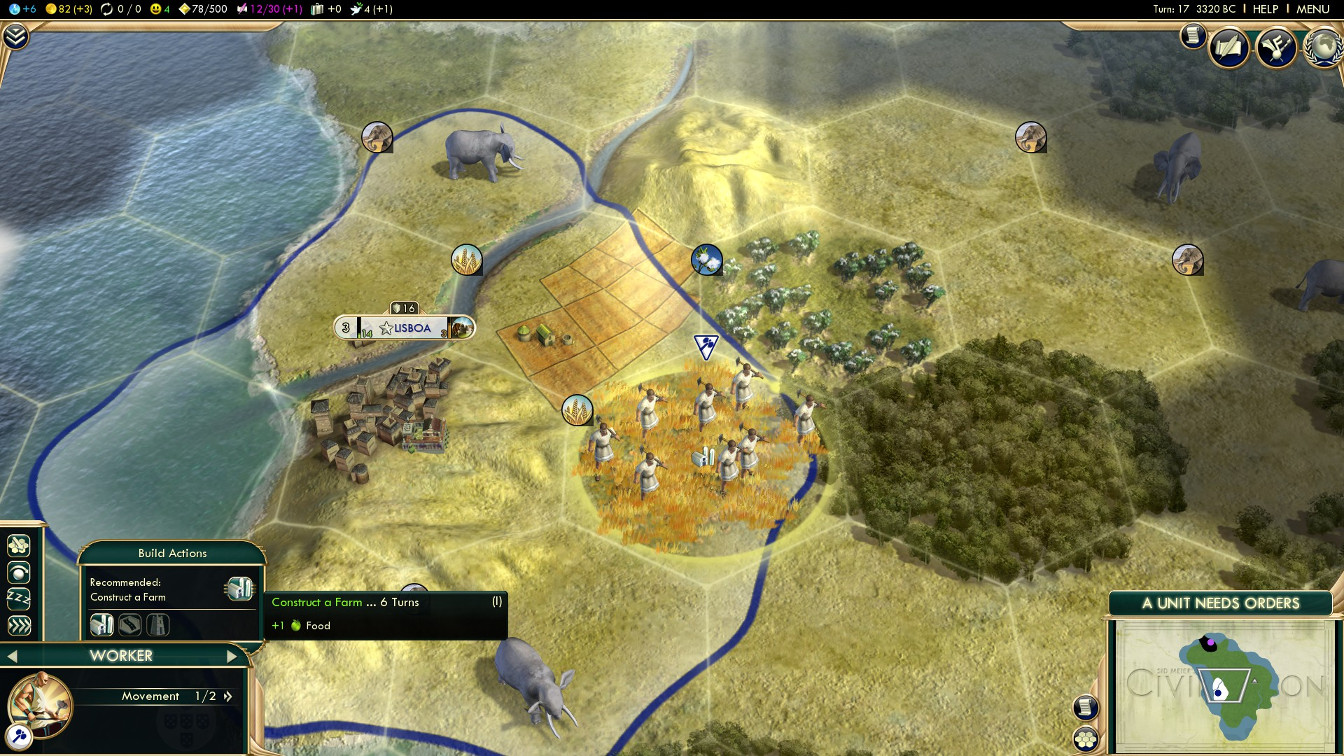 Back in Lisboa, our first Farm is done and we move the Worker to begin work on the second one, zooming in briefly to illustrate the visual difference between a hex with an improvement and a hex without one. 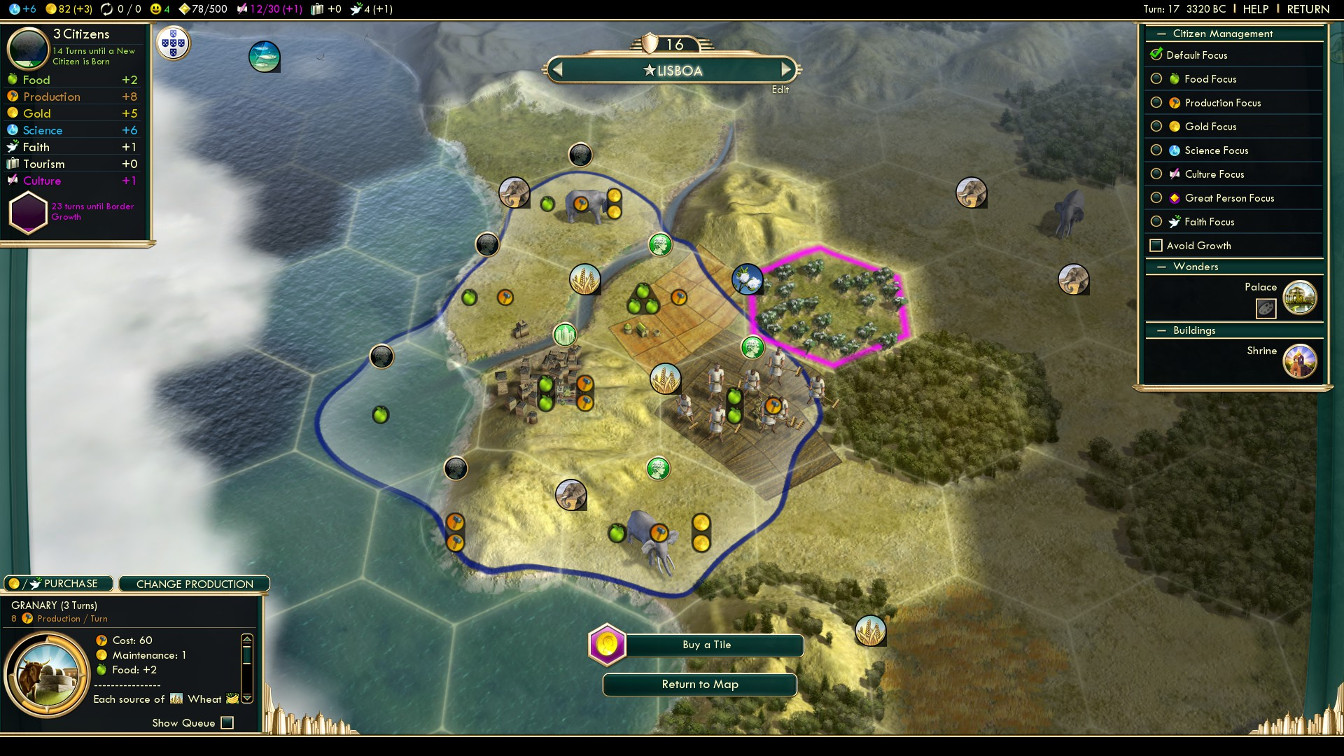 The City screen also shows us how we can expect the city borders to grow in the future (the purple hex), and approximately how many turns it will take to reach that point based on Culture. We also have the option of buying the border expansions with Gold, but that will have to wait until we have a bit more to spend. 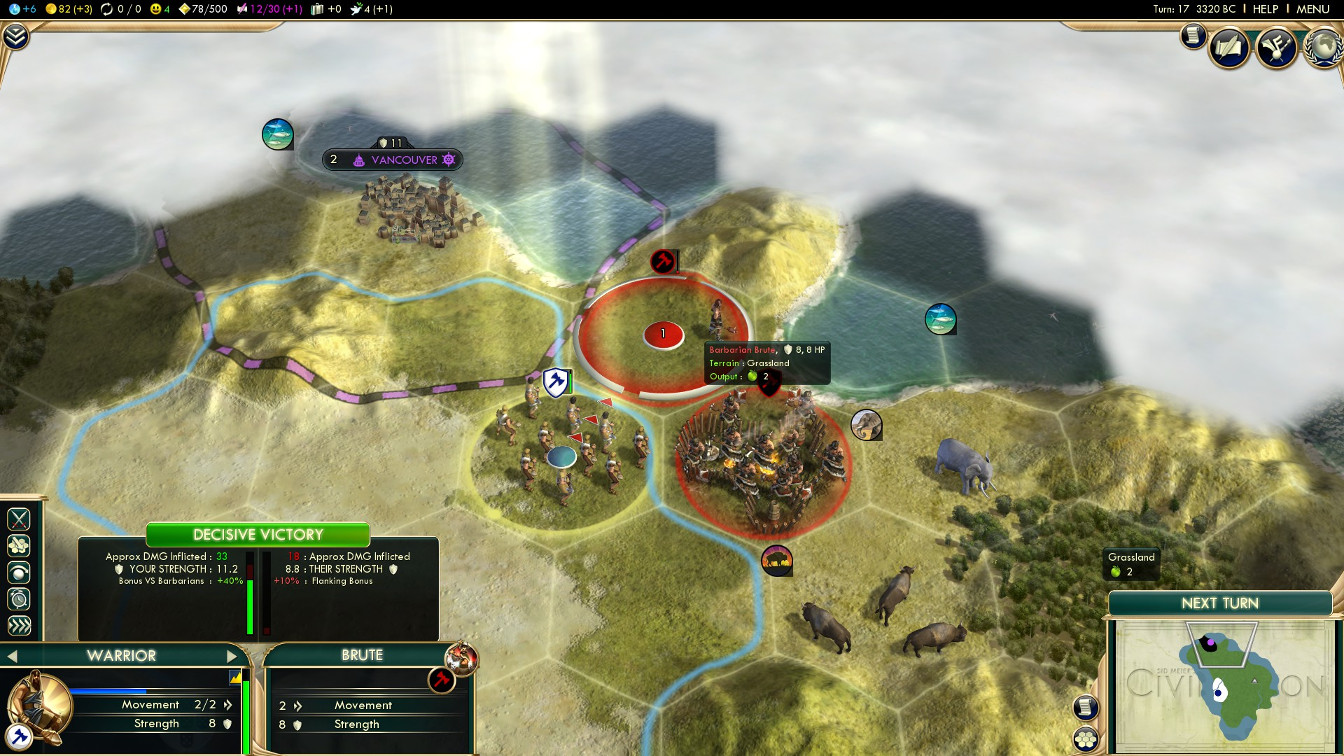 As I anticipated, the Barbarians retreated after Vancouver fired again, and now they are in prime position to be finished off by the Warrior. 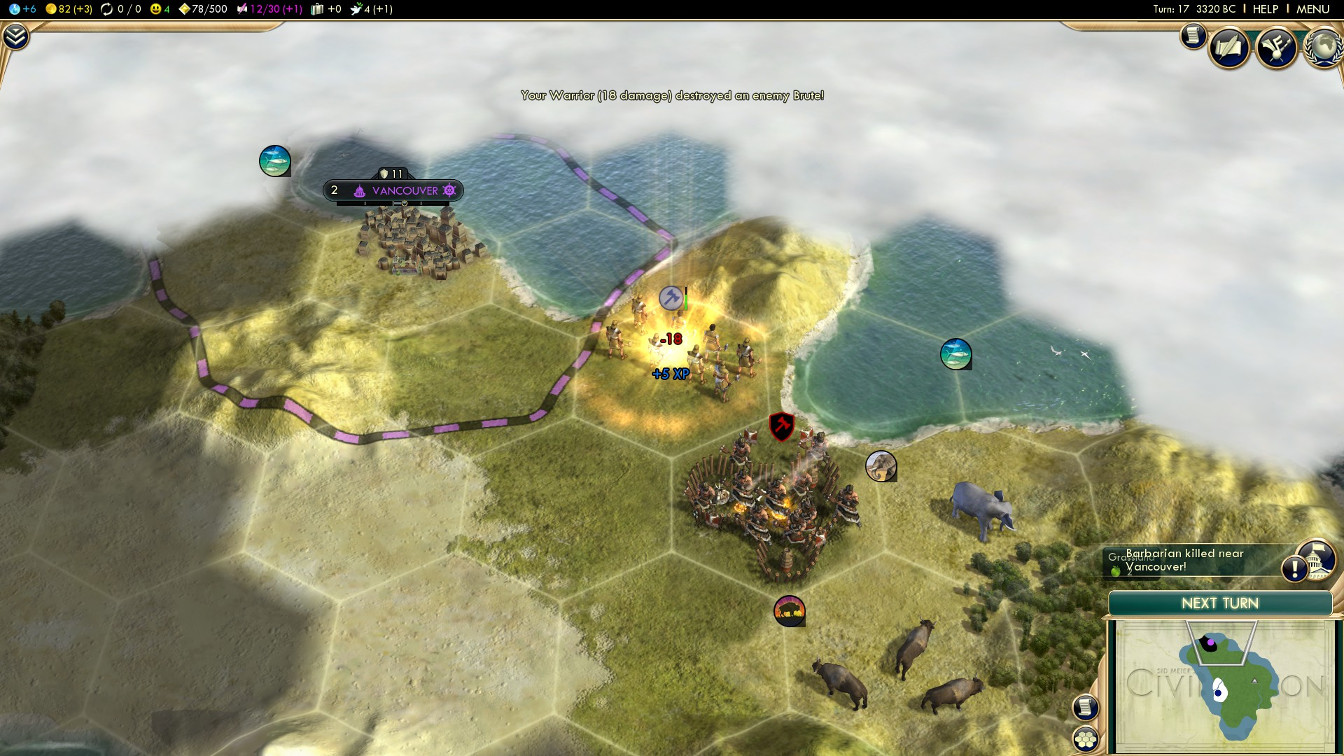 The Brute is wiped out, and the Warrior occupies its space.  As we killed the Barbarian in a space adjacent to a City State border, we also gain Influence with them through our demonstration of strength. Since we have gained this Influence, I opt to try to preserve it by offering a pledge of Protection, with the following effects:  On our next turn, something new: 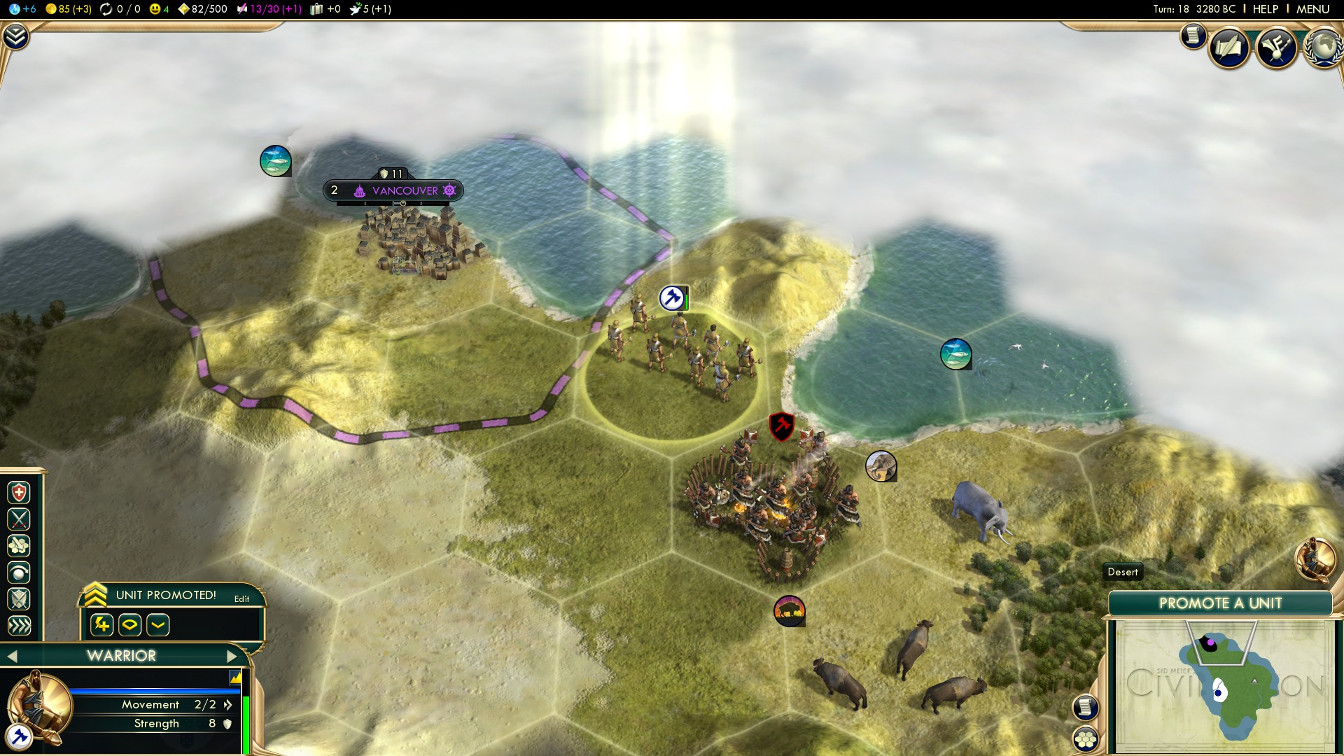 Our warrior has earned enough experience from Combat to gain a new perk in the form of a Promotion. Promotions for military units give a variety of situational bonuses based on a tree, and they become stronger the more frequently the unit is promoted. We can also opt to eschew a promotion in favour of instantly healing the unit by 50, which is another short-term advantage but long-term disadvantage. Given the terrain surrounding Lisboa and the availability of Mt. Kilimanjaro, I decide to give the Warrior the Open terrain bonus, which gives him +15% Strength when fighting on flat terrain with no Forest or Jungles.  And then, in a bit of a foolish move, I also decide to move the Warrior onto the hills to the north to make absolutely sure we are on a peninsula. 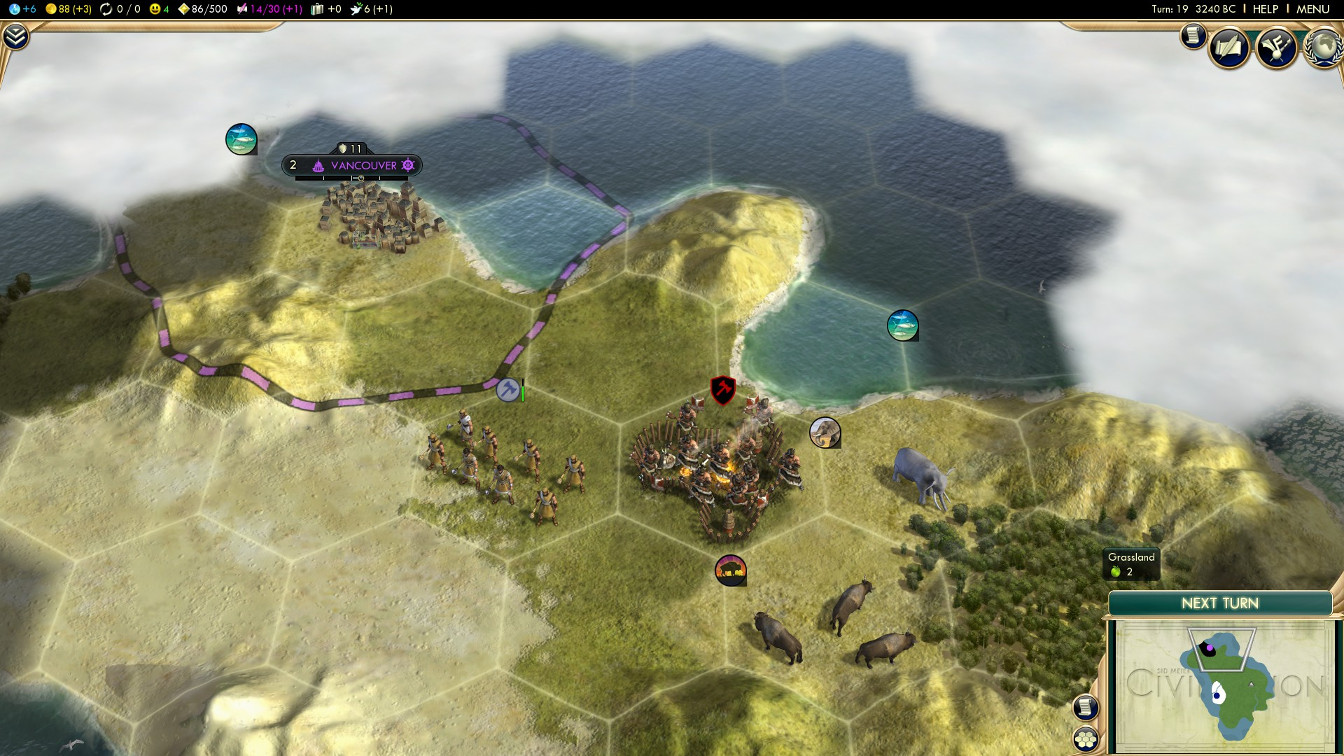 Thus, we begin moving back south (I can take two steps here because I was not in the enemy Zone of Control for the first step) to try to reinforce Lisboa, as I am a bit nervous about the Barbarians we spotted far to the southeast. 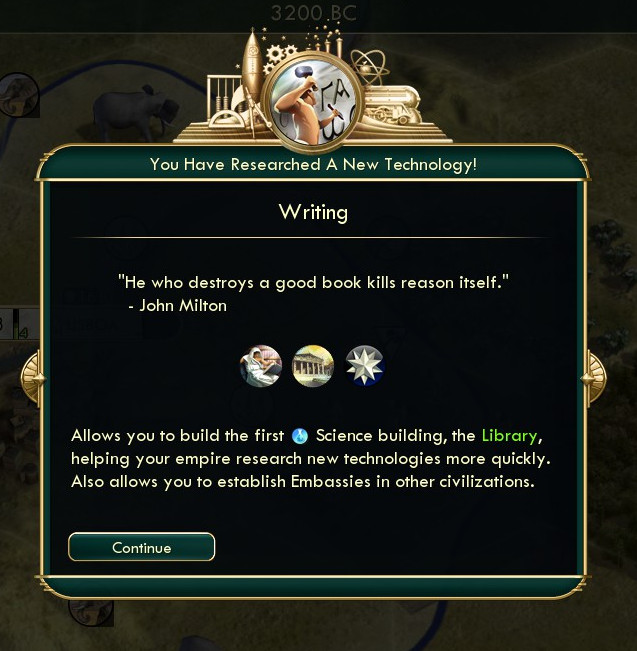 At this time, we have developed literacy in Lisboa, the better with which to spread the word of God. 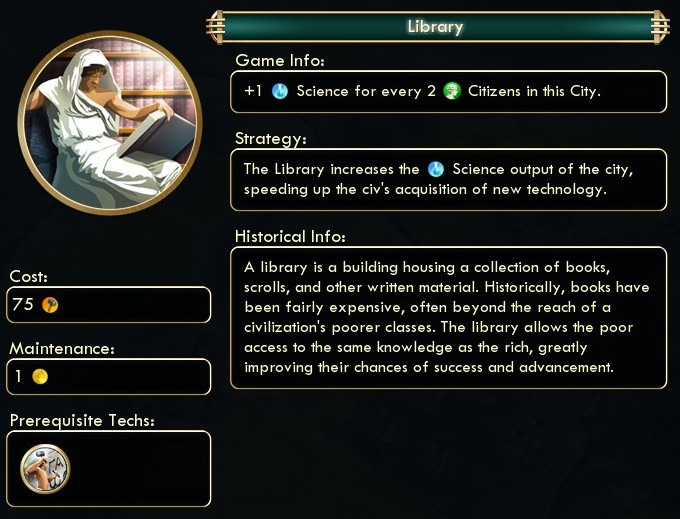 This development gives us access to the Library, our first Science building... 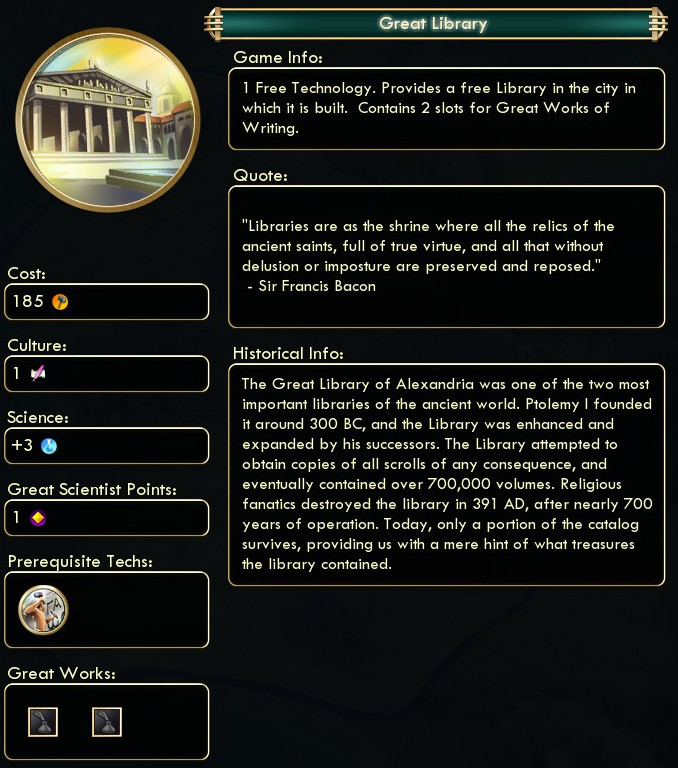 ...and its Great counterpart, which is our first Wonder. Wonders are technological and social achievements on a scale that history only ever sees once, and many real-life locations and UNESCO World Heritage sites are reflected in the Wonders available in this game. The Great Library, as you can see in the description, gives significantly greater bonuses than a regular Library, but its Production cost is significant and, in the event that another Civ starts building faster than us, we stand to lose a lot of progress if we do not finish building it first, as only one of each Wonder can exist in the world at a time. Keeping this in mind, I decide that Lisboa's efforts are better spent on the lesser Library, as the time to build great monuments to God will come later. 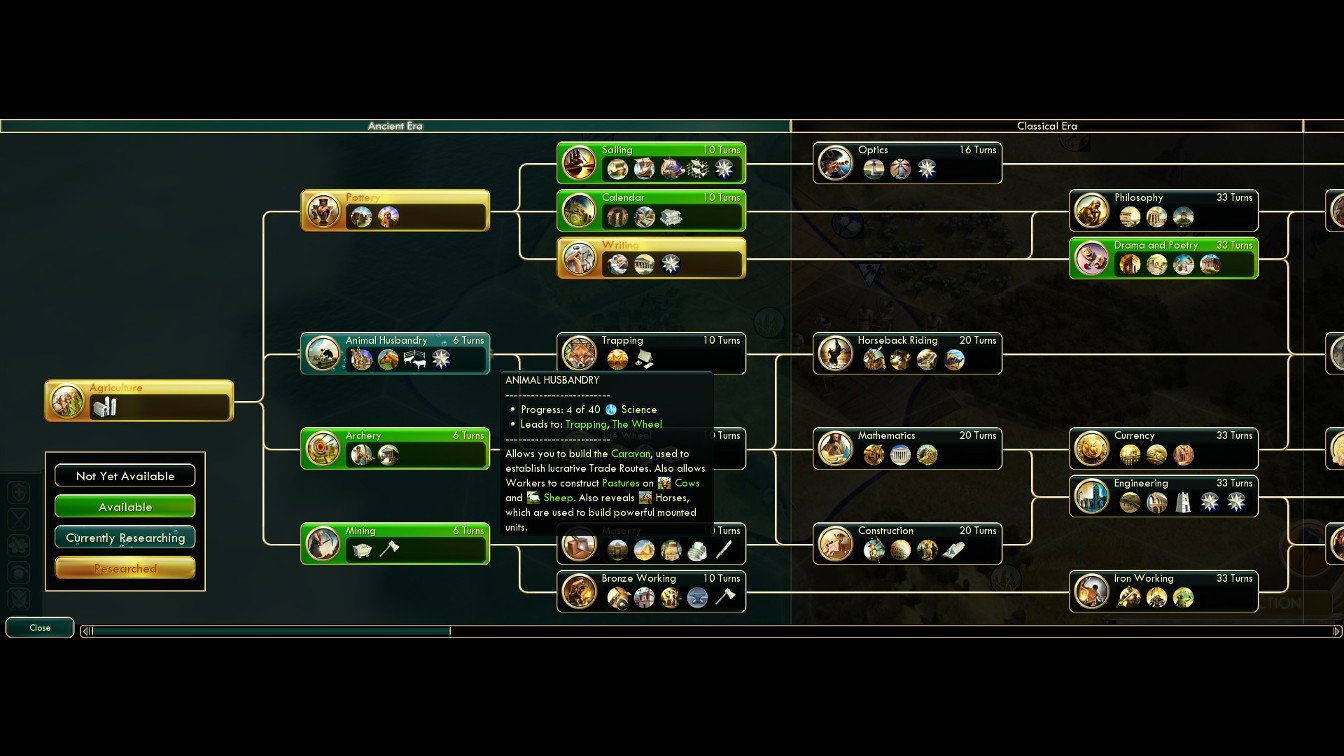 At this time, we also start researching Animal Husbandry, which will give us the benefit of access to new resources and trade caravans, which will soon allow us to start making use of our Unique Ability. 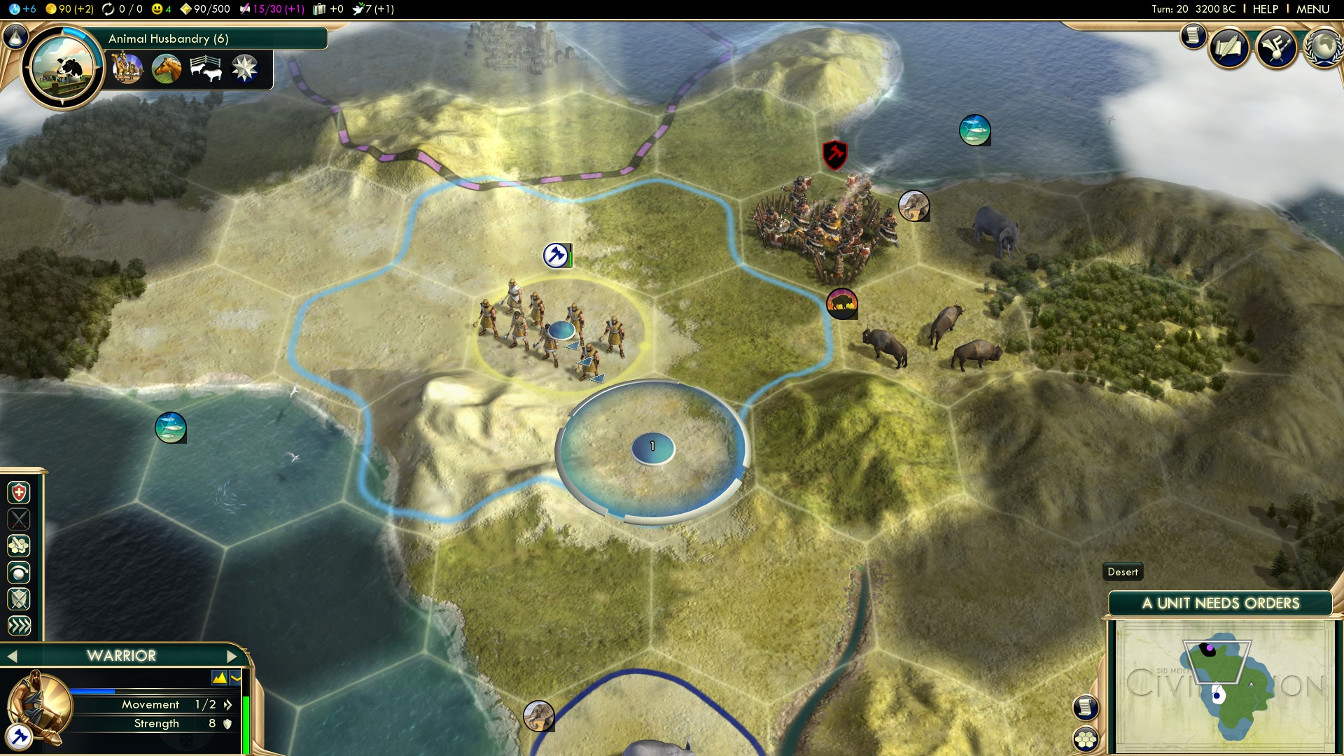 Per the earlier directive, we keep moving the Warrior south... 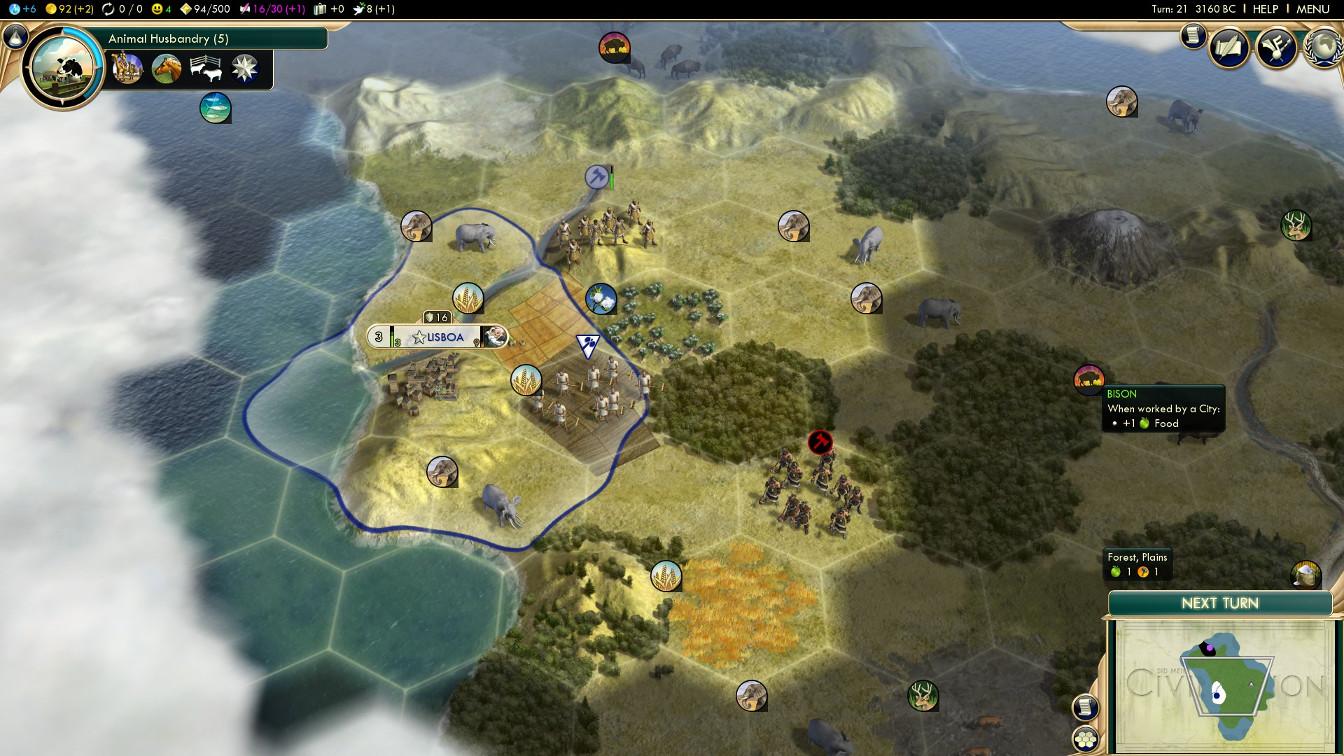 ...and not a moment too soon, as a Barbarian Brute looms to the east of the Workers. Workers are not military units, so they are automatically captured by any enemy military units that moves into their space. I do not wish to lose the early advantage the Worker provides, so I take a preventive measure.  By moving the Worker onto Lisboa, it is now protected by the city, so the Brute will have to siege the city to get at the Worker. Furthermore, my Warrior is positioned well to move in if the Brute attempts an aggressive step towards Lisboa. 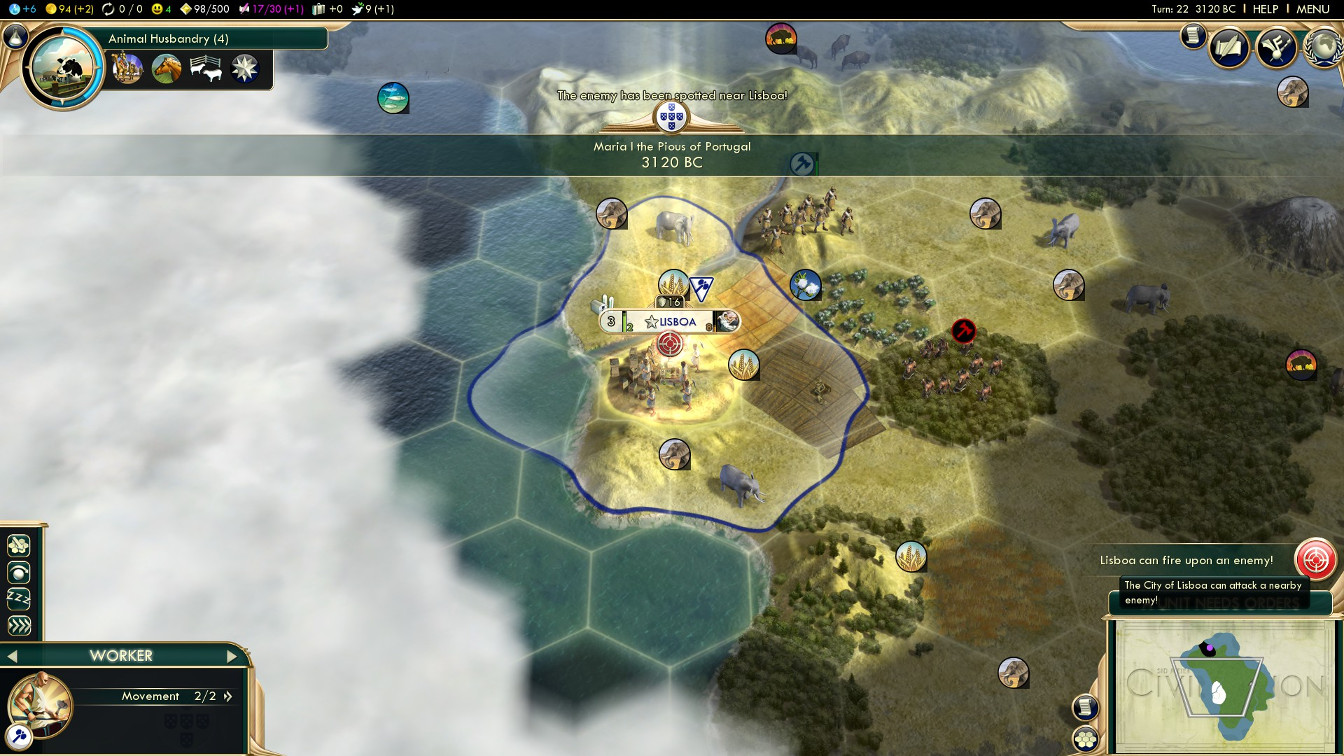 On the next turn, the Brute moves in tentatively, but still ends up in range of significant reprisal. 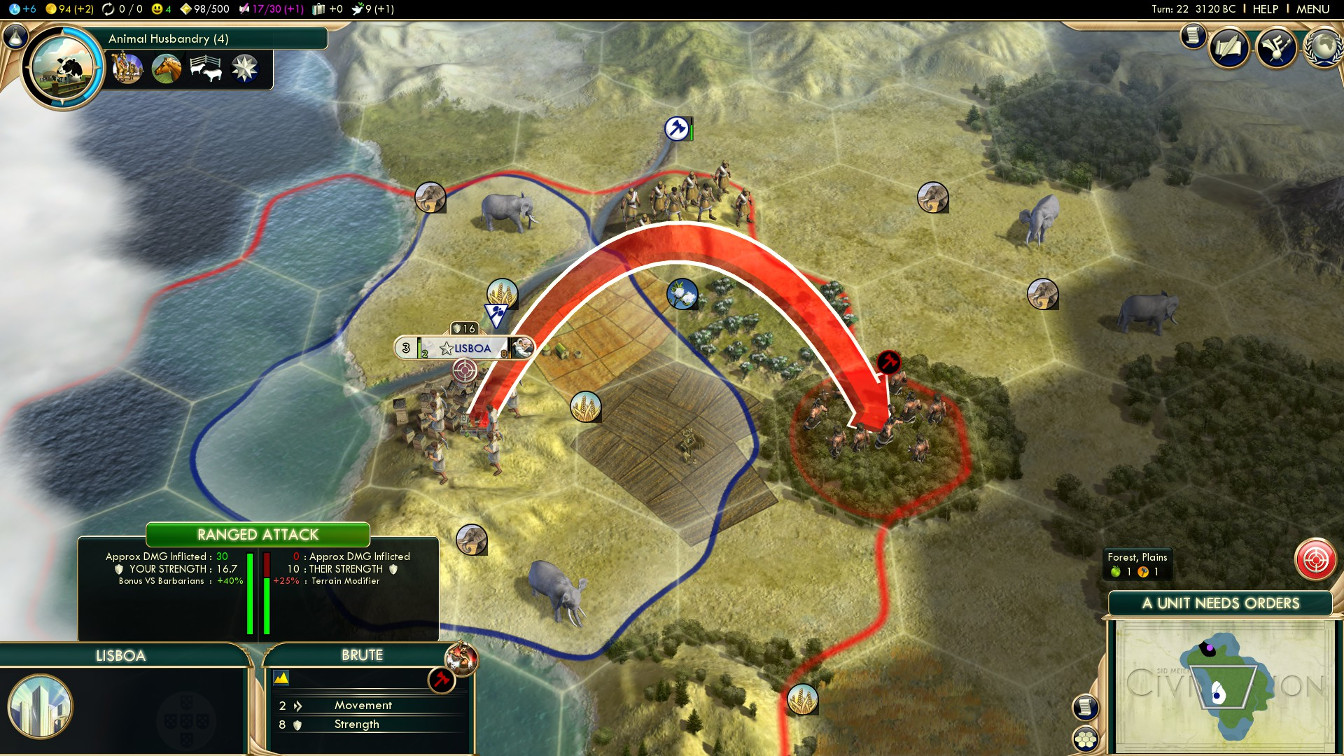 Lisboa's attack is weakened as units in forests gain +25% defence against ranged attacks, but it is still a decent source of damage. 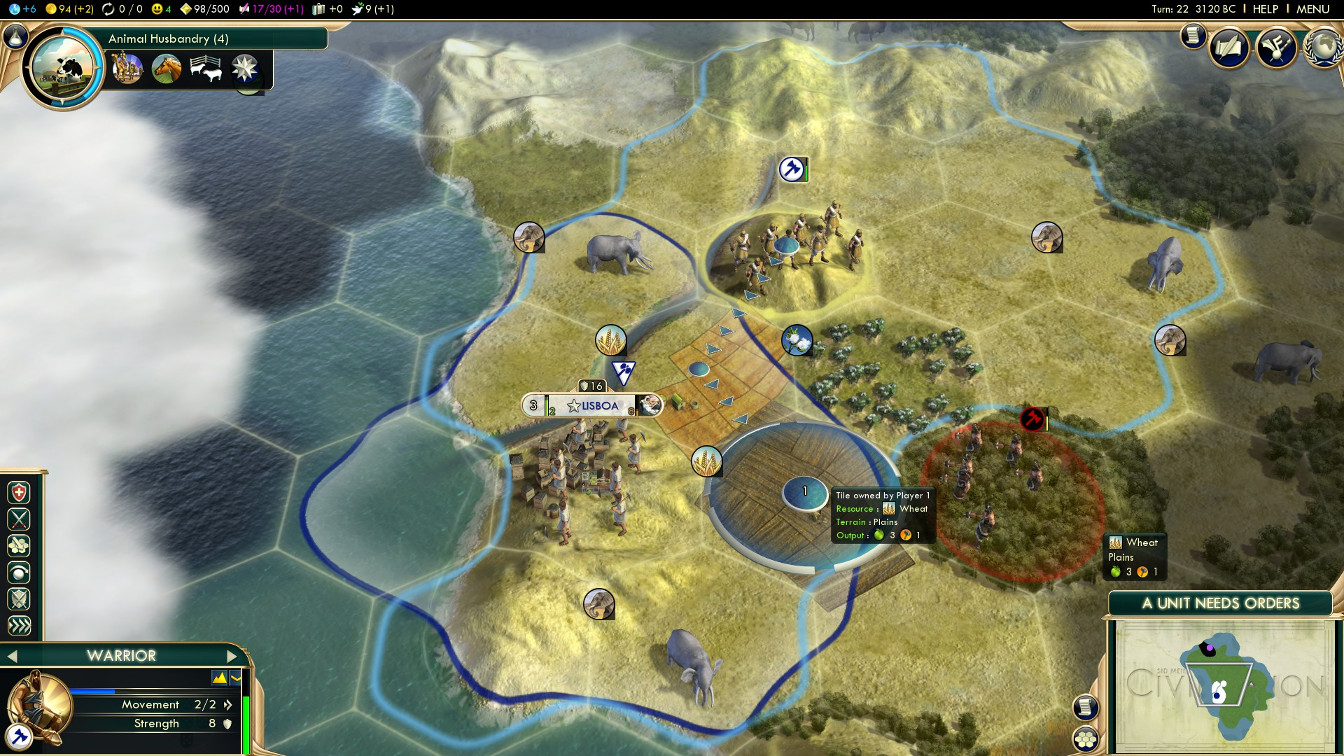 The Warrior moves in to block the Brute direct access to the Portuguese borders thanks to Zone of Control, and at this time we can take an interesting step towards maintaining our focus: 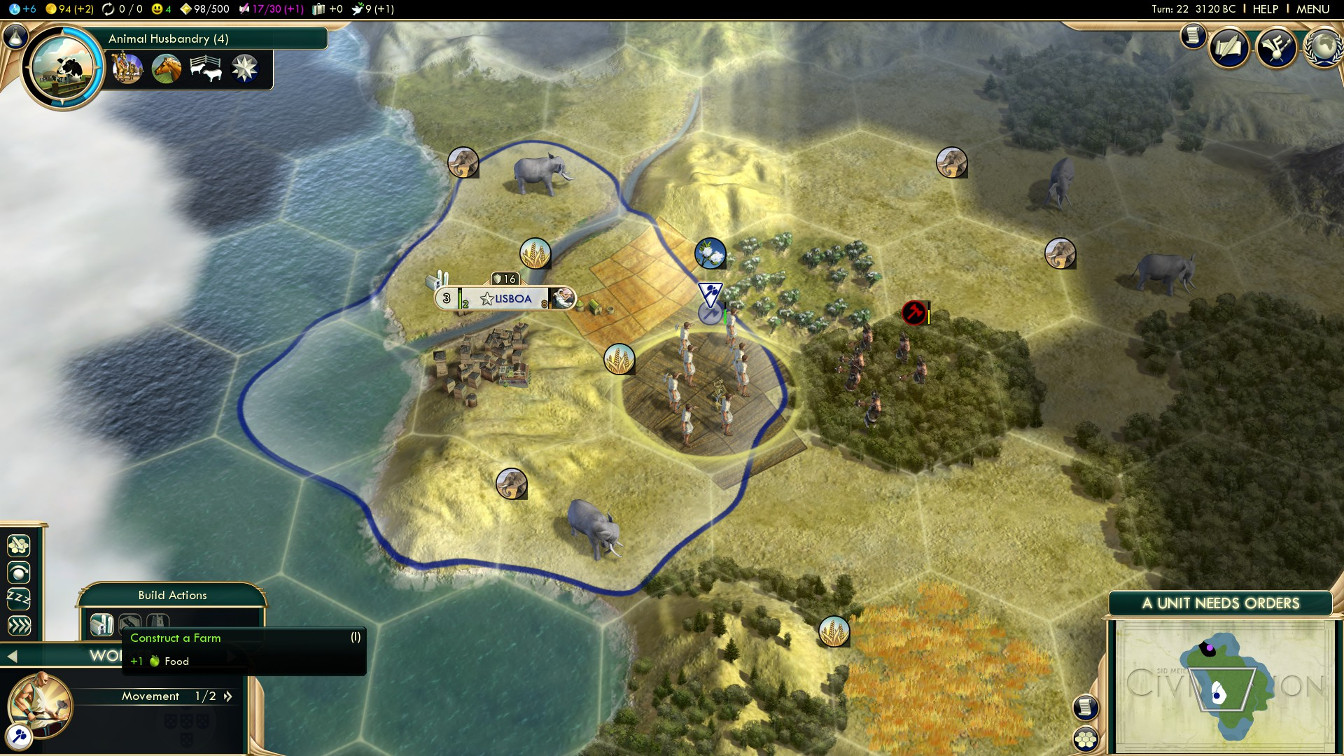 With the Warrior still in position, the Worker can move back onto the Wheat and continue construction of the Farm, resulting in a net loss of only 1 turn of construction. The Worker does not count as a military unit, so it can occupy the same space as a military unit, while still being protected by it. The only risk that bears is the possibility that the Warrior is killed and the Worker captured with the same action, but against a wounded Brute that is fairly unlikely.  The Brute moves onto the Cotton resource where it is at a disadvantage, so Lisboa fires once more and the Warrior moves to finish it off (though RNG leaves the Brute alive for one more turn). However, something else of great import has occurred towards the bottom right: We now have developed our Faith enough to create our Pantheon. The Pantheon is a minor bonus given to a Civ early in its Faith generation cycle, and takes the form of a bonus granted to a City depending on the Pantheon chosen. Only one of any given type of Pantheon can be chosen in a game, so as we have the first Pantheon, we have the choice of any of the bonuses we like, per the following list: 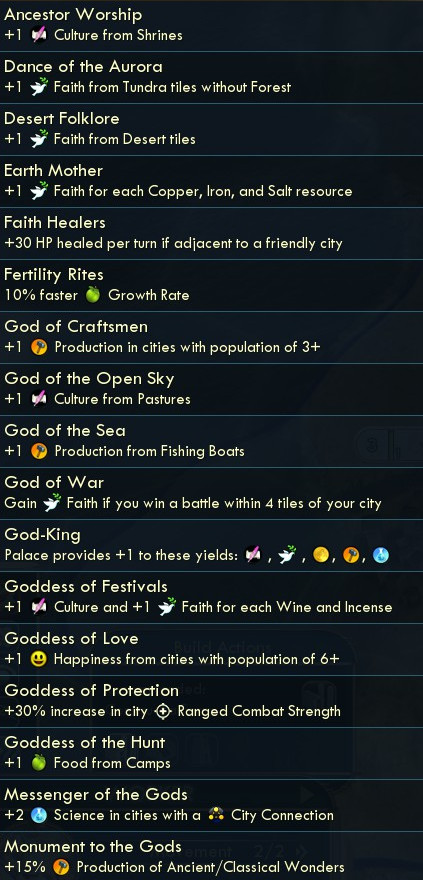  There is a lot to take in, but note that most Pantheon bonuses are contingent on having access to certain types of resources or terrain features. However, Dona Maria must listen to the voice of God first, and so I leave it to you to decide which Pantheon we follow. However, to that end, from the list above I have three suggestions: Goddess of the Hunt grants +1 food from Camps, and Camps can be created upon researching Trapping. The relevant portion here is that Camps are used on tiles where there are Elephants, and God has decided to grace this continent with a lot of elephants, so the bonus will be quite relevant to us in the future. One with Nature grants +4 Faith from Natural Wonders, which are relatively uncommon, but given that we will be attempting to add Mt. Kilimanjaro to our borders fairly soon, it may make sense to pursue this path to make its inclusion even more significant. Sun God grants +1 food to tiles with Citrus, Bananas, and Wheat, emphasis on Wheat. With this, Lisboa will gain even more food production and easily become one of the largest Capitals in the world. You are free to choose any other bonus from that list, but these three probably make the most sense for our immediate situation. However, we also have another matter that demands the attention and guidance of God: Where our society develops technologically. With Animal Husbandry, our people will learn more of the nature of beasts that roam the land, but not yet how to capture them effectively for the bounty of their hides and bones. They also know of plants to cultivate for food, but know not yet how to grow plants for making cloth or rope. To that end, they need guidance on how they should proceed not only to survive, but to thrive. How should we develop technologically when next given the opportunity? Calendar allows us to build Plantations for access to the nearby Cotton resource, which will provide Gold and Happiness, and Stone Works which we will not have access to since Lisboa does not have any Stone or Marble resources nearby. More saliently, it also gives us the option of building Stonehenge, a Wonder which gives +5 Faith per turn and may be the greatest demonstration of Portuguese devotion. Trapping gives us access to Camps which we will use to start hunting Elephants for their Ivory (more Gold, more Happiness), and allows construction of Circuses, which give Happiness at no maintenance cost provided there are Elephants or Horses within the city borders. Note that this choice also synergises with the Goddess of the Hunt Pantheon Bonus, so it is worth capitalizing on one with the other. The thread is also free to make a case for any other Technology to research next, as with the Pantheon Bonus choice, but I am just indicating the options that I feel make the most sense for the time being. Please cast your votes and decide our fate within 2 days, and I will see it through. 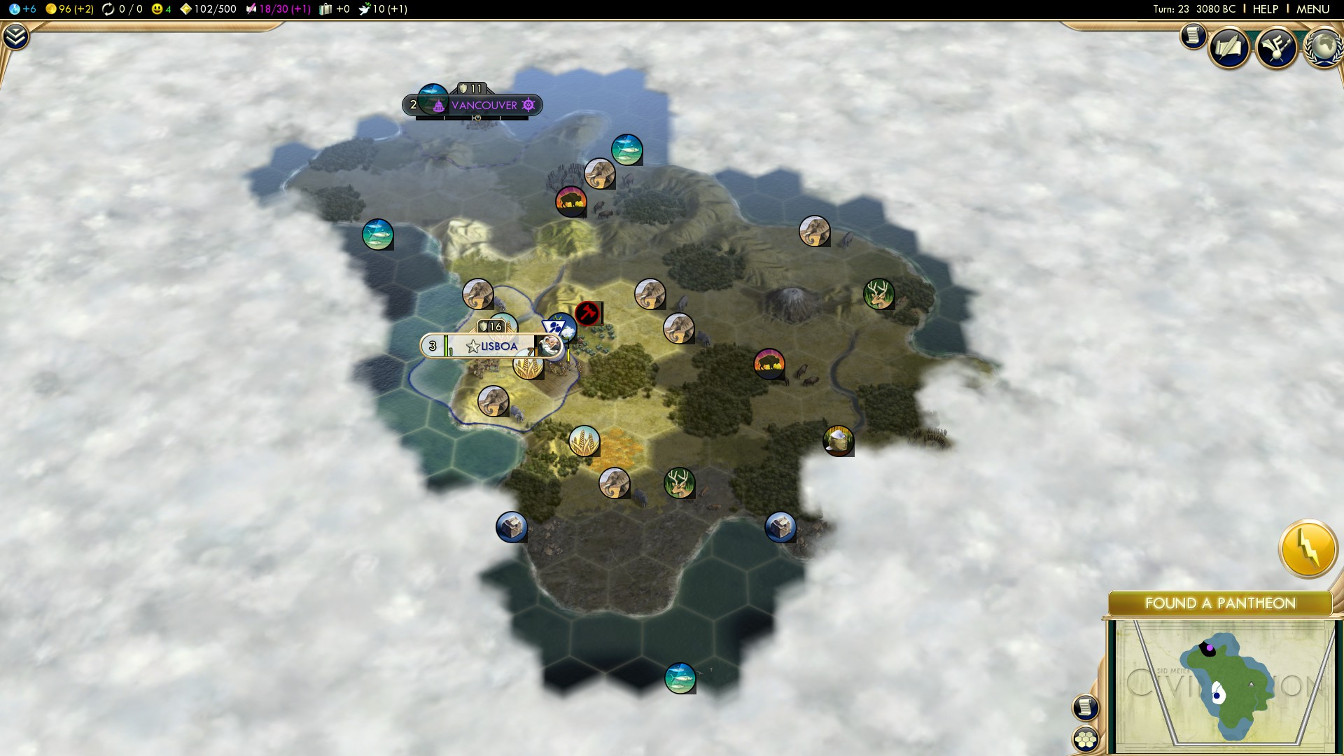 Finally, enjoy this zoomed-out screenshot of everything we have explored to date. I do not particularly like the alternate mapmode view, but if anyone would prefer to see that one please let me know. Also, let me know if I have shrunk the screenshots enough for comfortable viewing, and if not I will try the next batch as thumbnail screenshots to preserve their size and detail. Até mais logo!
|
|
|
|

|
| # ? Apr 23, 2024 09:18 |
|
Sun God and Calendar. I never found religion very useful unless I can squeeze one out without much effort on my part, like my last game as Spain where Mount Fuji was on my starting island, so I'm curious how useful it will be to a civ with no religious bonuses.
|
|
|


